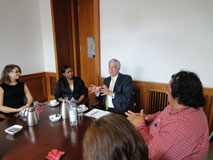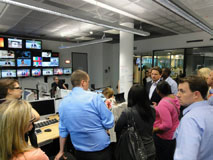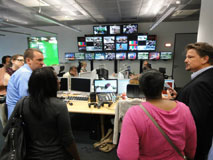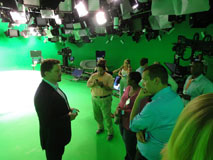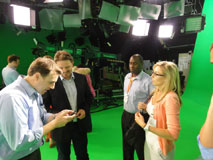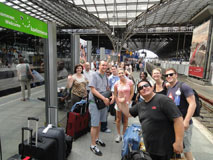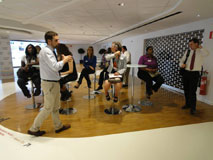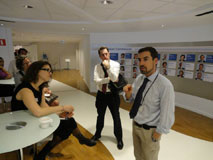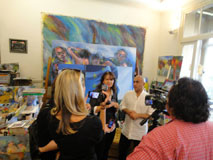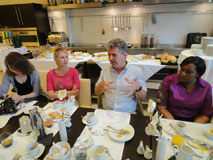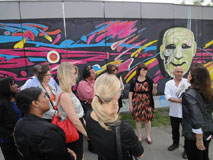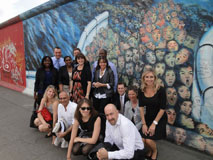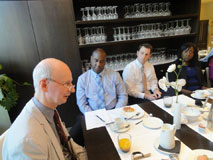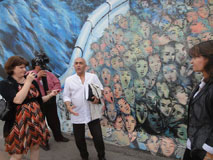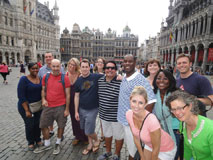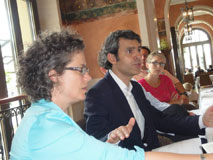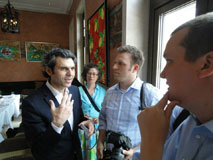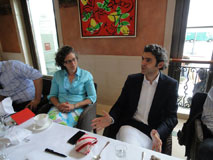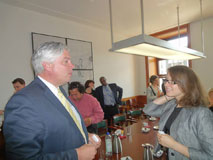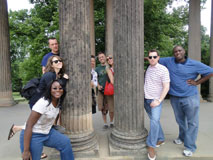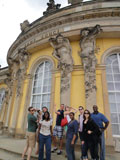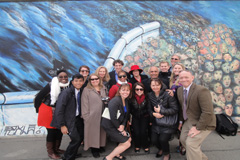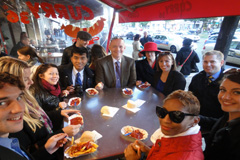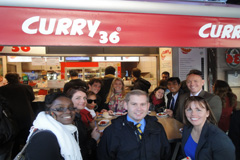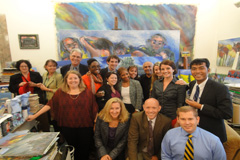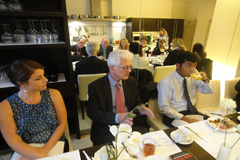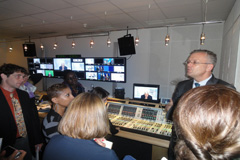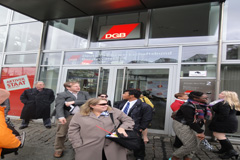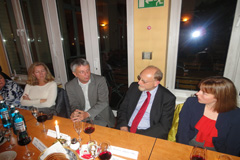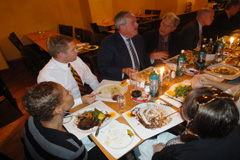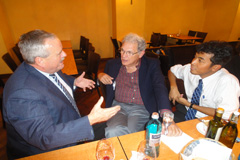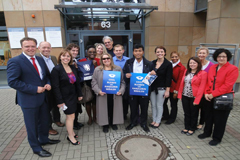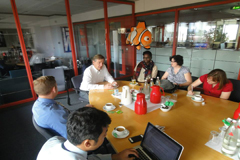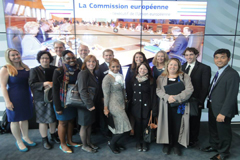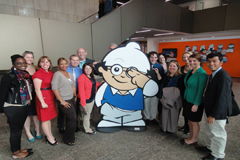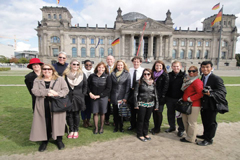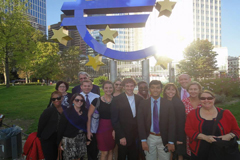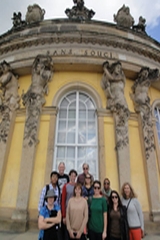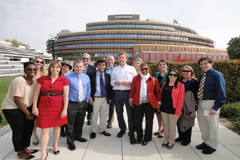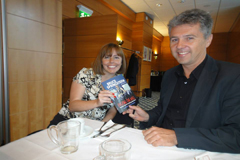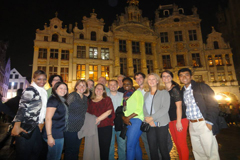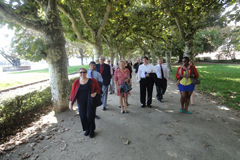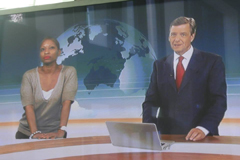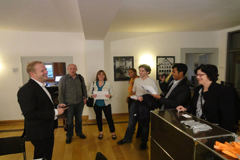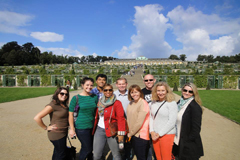TWO-WEEK GERMANY PROGRAMS 2013
Summer and Fall
RIAS Germany Program – Summer
June 10–24, 2013
Thirteen U.S. journalists participated in the 2-week Germany program. With Berlin as starting point they also visited cities Bonn and Cologne and the EU and NATO in Brussels. Individual extension program for four participants.
REPORTS OF PARTICIPANTS
Jessica Baker, CNN Newssource, Atlanta, GA
You may not realize this, but that cab driver picking you up from the airport can be one of the biggest influences on your impression of a newly visited country. Ask yourself, who’s there on both your arrival and departure? Who’s often offering the first and last impressions of the city you’re visiting? That’s right, it’s the cabbie. My first notable encounter in Germany came from this unexpected source, although it should not have been so unexpected if you think about it. That 30-minute drive from the airport to the hotel offers ample time for conversation, if your cab driver is willing to talk. And, in my case, he was.
The comparisons did not end in that taxi cab ride. Days into the program, the questions my group posed to our speakers were evidence that many of us sought to understand German politics and the German press through the sphere of our American experiences. First, came the meeting with an official from the Social Democratic Party. It was still early in the program and the group was struggling to grasp an understanding of the German political system. The biggest source of confusion: the two-vote system. One vote for the party and then another for the representative? It was a concept so foreign, the SPD official ended up having to teach a course in it. She was peppered with questions that sought to find the American equivalent of Germany’s two-vote system. Was it the same as voting for the House of Representatives and the Senate? What about voting in both federal and local elections? The comparison attempts were so rampant at one point I overheard a fellow participant mutter, “You can’t compare the two!” I nodded my head fervent agreement, although to this day I don’t know why I did that then. Perhaps I wanted to be a part of some shared sense of frustration. Or maybe I was just eager to move on to a different topic. Either way my true understanding of that statement, “you can’t compare the two,” wouldn’t come until days later.
Not even when a member of the Green Party told me, point-blank, that the political consciousness was “more homogenous” in Germany without the deep divisions between parties that you see in the United States, did I realize how the basis of my interpretation of German politics was flawed. No, I wasn’t intentionally seeking to compare the German and American political systems. But I know now my questions were clear indications that I was subconsciously making those comparisons. I’d asked the Green Party official whether he thought the larger Social Democratic Party would continue at the forefront of championing renewable energy when that party had so many other pressing issues to address, including the push to establish a minimum wage. His response: the promotion of renewable energy has been a rallying point for more than just the Greens and SPD.
That answer left me baffled. Different parties, on opposite ends of the ideological spectrum, rallying behind a similar cause? The idea didn’t fit neatly — or at all — in my world of political alternatives. I’d become so used to a predominantly two-party system, I could barely fathom how to wrap my mind around a multi-party one. In the United States, politics is typically black and white. If the platform of the Democratic Party is to support abortion rights, then it goes without saying that the Republican platform is anti-abortion rights. If Democrats are pushing for a new health care reform law, Republicans are right on their heels looking to repel it.
Gray areas rarely exist in the American politics. And, after only two weeks, I can’t say with any certainty how often those gray areas exist in Germany either. But what I can say is speaker after speaker in this program seemed to be under the impression that German politics isn’t so divided that multiple parties can’t work together for a common cause. I know what you’re thinking. Well, that’s the benefit of having a multi-party system. You have options. There are more potential dance partners lining the wall, waiting for you to pull them onto the dance floor. Of course, that’s true. We see evidence of that in Germany’s coalition government. But what I was surprised to find out is that parties I considered to be on opposite ends of political spectrum indicated a willingness to support an issue backed by a rival group, even if that meant changing the party position.
For some reason, realizations rarely come to me gradually. They typically knock me over with the force of a Mack truck. While the shock of such a sudden realization may shed a few treasured years off my life, it does have the benefit of allowing me to more vividly recall the moments when my way of thinking is completely uprooted. On this trip, it happened during a meeting with the Christian Democrat Union.
First, some background. I was well aware that Germany was a multi-party system with the two largest parties being the Social Democrats and the Christian Democratic Union. Due to its free market ideals and social conservatism, I had equated the CDU with the Republican Party in the United States. Likewise, the SPD’s socially liberal ideas led me to identify that party with American Democrats. Again, it was an instance of my seeking to understand Germany through what I knew best: the American political system. How wrong I turned out to be.
I’m sure much of what was said in that meeting with the CDU minister was off record, so I won’t quote him. What I will do is relay the general feeling I walked away with after that meeting. I had been right in assessing that in terms of its traditional values the CDU’s ideology does align closely with that of the Republican Party. But I had been wrong in thinking that Germany’s political parties, be it the CDU, SPD, or otherwise, are as unmoving in their party positions as political parties in the United States. Instead, I left with the impression that Germany’s political parties welcomed, and to some extent, courted change.
In all honesty, the realization should have hit me sooner. Hadn’t I read articles about Chancellor Angela Merkel pulling the social policy rug out from under the Social Democrats, adopting policies that traditionally appeal to SPD voters? Didn’t I recall reading that some members of the traditional family value-oriented CDU were now pushing for certain rights for gay couples? Clearly, the clues that German parties are willing to readily adopt new political positions were there. And, maybe I’d been building up to that realization all along with my readings and days of discussions. But it took one meeting, one pointed exchange for me to truly understand how different that was from the American political system and how that supported the argument that, “you can’t compare the two.”
Of course, I can’t be too hard on myself. I am an American so it should come as no surprise that I would look out on the world around me through an American lens. But what I realize now, after the RIAS program, is that true understanding comes from ‘thinking outside the box.’ It’s a cliché you may have heard once or twice before, but go back, read it again. Have you ever really stopped to think about its meaning? I’d always considered the phrase to encourage coming up with new, unconventional ideas. Now, I recognize it for its broader interpretation — to embrace new ways of understanding. This is the awareness that I’ve gained from the RIAS program. And to think, it all started in a 30-minute cab ride. Who knows, had the cab driver not set the tone for making comparisons would I have realized I was doing so myself? Maybe I never would have stopped to ask myself, “Why am I making so many comparisons between the United States and Germany?” I can’t promise I’ll never begin another sentence with, “So is it like….?” But I am now more aware of the need to seek to understand another country’s culture and politics as separate from your own not in comparison to it. Luckily, that awareness came at the end of the first week so I was able to utilize it as we continued our travels through Germany and into Brussels. I’m grateful to the RIAS program for opening my eyes to that new way of understanding, and, of course, for giving me a whole new appreciation for taxi cab drivers.
——————
Jamie Coughlin, WMAL Radio, Washington, D.C.
Early on a Saturday morning in Kreuzberg, neighbors sit at street corner cafes sipping espresso and picking at pastries, chatting softly, reading newspapers or playing chess. The sense of calm energy in Berlin is unique and enveloping. It’s a city where the past follows the people around corners.
Coming to Berlin for the first time and participating in the RIAS program is like having a special window into the city. It’s a way to begin to understand all the intricacies of two societies that have been rolling around together in a blender for nearly 25 years and still aren’t quite mixed. RIAS is an incredible opportunity to learn about both the history and current political landscape of Germany
A favorite cultural experience of mine was wading through the sea of people gathered on the hillside at Mauer Park on a Sunday. I sat in the shadow of the Wall in the old East listening to Berliners likely from both sides singing karaoke in English to American and British songs at the tops of their lungs. Berlin is a city full of quirky cultural experiences like this. The people in Germany are intelligent, friendly, and notorious rule followers willing to let you know if you’re in the wrong (don’t jay walk someone will shake an angry fist). RIAS is great at setting up interesting excursions that allow fellows to interact with German journalists in casual settings that foster useful discussion and cultural understanding.
One evening, Rainer arranged for a few of us to attend a house party where a pair of musicians were performing. They were kind enough to translate their banter with the crowd into English for us every so often and sang a few songs in English, but their German songs were by far my favorite. They spoke of growing up and performing in the East and traveling to Hungary to get banned music. These were stories and perspectives I otherwise wouldn’t have been privy to on my brief visit and I’m grateful to Rainer for letting us in on that intimate experience. I knew this before visiting, but not the full extent: Germans are incredibly averse to sharing personal information. As a journalist it would change the way you conduct your work. You cannot take a picture of someone in a public area and publish it without the person’s consent. You have to blur license plates and surveillance camera video is deleted within hours. Edward Snowden’s NSA surveillance revelations began to trickle out while I was in Berlin. Taking them into account, the Germans now seem quite wise to be so wary of their government (and other governments as well). Speaking with reporters in Cologne and Berlin helped me to understand these privacy differences and how journalists work around the restrictions very useful information should I find myself reporting in Germany in the near future, as I hope to.
German media seems sharper in many ways than American media and better avoids the race to capture the lowest common denominator. The dichotomy between public and private media is fascinating and something I’d like to further explore. Although opinions of public media and mandatory contributions vary throughout the country, an important positive result seems to be the breadth of coverage. Less populous areas have greater access to local news than similar areas in the U.S. there are whole swaths of country in America that lack basic journalism, to say nothing of investigative reporters. Meeting with staff at both public and private media was interesting and highly instructive. As far as governing is concerned, Americans have a lot to learn from Germans. I’ve always admired coalition governance for allowing the opinions and perspectives of more than just those who yell the loudest. The fact that a group as relatively small as the Green Party has representation in the Bundestag is quite incredible we have only a few who even call themselves Independents left in the entirety of Congress. Having the opportunity to meet with representatives from so many of the political parties and learn more about how they work in conjunction helped to better understand the system.
A couple of weeks isn’t enough in Berlin. This city takes you in and teaches you lessons you didn’t know you needed to learn, leaving you with far more questions than answers. RIAS lit a spark in me. I’m fascinated by German politics and people, and hope to soon report for an American audience from Berlin. A million thanks to the wonderfully funny, kind and helpful RIAS team I’m looking forward to staying involved in the program and meeting more RIAS alumni friends.
——————
Autria Godfrey, WJLA-TV, Arlington, VA
First things first, this fellowship was beyond anything I had anticipated. What I thought I would get from my two weeks in Germany was a broad stroke understanding of German politics, with a little bit of insight into the way the media operates. I was grossly underestimating how much I would see, hear, and learn. Personally, I had three big takeaways from my time abroad: the political process, the media influence, and German sentiment toward Americans.
The political process — America could learn a thing or two. Hearing that education, wage discrepancies, and gender gap issues are the key issues driving November’s elections didn’t come as a surprise. Even in an economy as strong as Germany’s, there will always be the hyper-local issue of people unhappy with their paycheck. But I think that the wage discrepancy is something that is continually pushed aside here in the United States, so the fact that it is a central point in the election is impressive. Hearing from heads of several of the various political parties was eye-opening. I realized I had no idea how the political process works anywhere outside the U.S. I like the idea of the candidate introducing a shadow cabinet before the election takes place. I think the public SHOULD know who all they are voting for, not just the candidate, but the people they plan to surround themselves with. That seems much more transparent than our method. Most impressive though, is I got the sense the voting public is much more educated on the candidate and their platforms, than here in America. By having political parties be a paying member, and with the lack of television smear ads, you get the notion that when voters head to the polls, they have a much greater understanding of who and what they are voting for. Because the campaigning isn’t the same in your face method we have (that stretches on for 2 years instead of a couple of weeks) people actually have to seek out information about their candidates, thus making them much more well-informed. Again, something I think we could learn from.
And that brings me to the media influence. I think there was a collective gasp from all the American journalists in the room when we found out that millions of dollars (or euros) are NOT spent on television campaign ads. That has just become the go-to method of campaigning here, so to know that people are watching their news programs on public broadcasting without ever seeing an ad is hard to digest. Having both public and private broadcasting options appears to make for a better informed public. Although, we didn’t really get a good understanding of the way public broadcasters would cover a story on the government entities that fund them and regulate them. Here at home, it’s easy as a journalist to go after any group or government agency because it’s private corporations that keep us afloat and on the air. But when that question was posed to our speakers from ARD, there didn’t seem to be a clear answer as to how that would be handled. Regardless, the dual system of private and public broadcasting was fascinating. Oh, and the lack of local news coverage (as in some stabbing in a remote city that nobody cares about) was nice.
Finally, my biggest takeaway was German sentiment toward America. From the meetings with journalists who spoke fondly of American intervention during Hitler’s reign to Chancellor Merkel’s defense advisor talking about America’s global role; it was clear the affinity toward the U.S. remains. In my notes, I wrote down that “The U.S. is seen as the powerhouse that keeps the rest of the world in check.” That was the answer from Merkel’s defense advisor when I asked him about losing credibility after the wars in Iraq and Afghanistan. It really struck me for him to answer in that way and say that we are still highly regarded (especially with future military action) on a global scale. Maybe it’s the cynical politicos I’m surrounded by, but I would say the war in Iraq specifically was thought to have chipped away at our authority. Our time at NATO was eye opening in this aspect as well. Coming out of those meetings, the general consensus was that NATO needs us more than we need NATO. We found it fascinating that some of the requirements, specifically defense spending, aren’t being met by a large number of member nations. So the thought becomes, are we just the powerhouse because of our pocketbook? We just pick up the slack where others won’t? This was a concept debated on our bus ride home to Brussels.
I have to say, there wasn’t a day that DIDN’T leave an impression. The Stasi prison, the U.S. Embassy, the Reichstag, the Chancellery, the European Commission — every stop and each meeting was one that made me think “wow, did I really just get to experience that?” I couldn’t believe the access we were given to some of the leaders and key people helping shape politics and foreign policy.
My ONE suggestion is for the “blind date” night. I was set up with a perfectly lovely man who took me to dinner and a stop on the river. However, it seems other fellows who were paired up on group dates, where they went to a person’s home and enjoyed authentic home-cooked German food, has a much more pleasant time. I think that maybe this is something best enjoyed in a group setting or at least on a “double date” type set up. Just a thought!
Thanks for the time of my life!
——————
Darcelle Hall, WIAT CBS42, Birmingham, AL
The RIAS program was a life-changing experience for me. Besides being my first trip across the ocean to Europe, it turned out to be an experience where I would learn more than I ever expected. At first, I thought that maybe I would tour a few news stations, see some cool gadgets, eat something different, and go home. It was so much more than that. I got a sort-of crash course education of Germany as a whole. From government, history, economy, education and lifestyle, so much was covered in such a short time, and was overall very entertaining at the same time. I not only saw how the media business operates, but how other industries operate as well. It gave me a view on what’s important to the people of Germany, and what they expect from media, and their society.
Living in the U.S. and working at a local TV news station, I’ve realized how easy it is to sharpen your focus only on local issues, and in a way ignore what else is going on in your state, region, and country. I’ve (reluctantly) noticed and admitted that I was doing that in my own work. Now, I see that I’ve improved my own product by expanding my focus. I think it’s led to my own newscasts being smarter, more thought-provoking, and still, at the same time, entertaining.
I applied for the RIAS program to “expand my horizons” and “get out of my box.” I did. And it has paid off already, with my experiences being reflected in my work, and my own way of thinking.
This was a very well-put together program that allowed of all my group-mates to learn so much, yet still have a very good time. I would recommend this program to any journalist who needs a chance to experience a different way of life and use it to improve their own.
——————
Herman Howard, Benedict College, Columbia, SC
The Media and Political Strata of Germany in the Post-Modern Era.
The 2013 RTNDF/RIAS summer program in Germany and Belgium was a special one. With the fall German elections approaching, the Obama in Berlin visit and the annual RIAS awards at the Rathaus Schoneberg, the 2013 summer program was a momentous occasion for the American participants. From the 2013 program, three events that were special learning points were the Erik Kirschbaum discussion on his Bruce Springsteen text, television anchor Ali Aslan’s lunch time talk on the German educational system and our visit to the United States embassy in Berlin with our group round table discussion with James Melville.
Our Thursday, June 13, 2013 breakfast discourse with Erik Kirschbaum was informative. The American born citizen who now resides in Germany as a correspondent opined on his upcoming book on Springsteen’s 1988 free concert. What was interesting to learn was in how Kirschbaum was able to collect his data, through historical interviews along with the consuming task of transcribing his interviews for the book. Kirschbaum was able to infuse primary sources for his research which I feel will be a successful sale of his book due to the realism presented with his writing approach. Later in the same day, we heard an insightful presentation from television anchor Ali Aslan. What was most engaging from Aslan was that Germany has a 3-tier educational system and by the age of 10, a student receives a recommendation which can determine one’s fate in the higher or lower tier educational tracks. According to Aslan, most immigrants are placed in the lower tier schools because they are unable to grasp the German language in comparison to students who derive from upper-level incomes or have German-language speaking parents.
In addition, the tour to the United States embassy in Berlin was historic and informative. Of all the dignitaries and leaders we met during the entire tour, I was impressed that Deputy Chief of the United States Mr. James Melville took the time and preparation from his busy schedule to study everyone’s name in advance and know their hobbies and interests during our introductions. Melville narrated on the importance of Foreign Service and the future importance of US-Germany relations and noted the overall context of the Obama in Berlin visit by stating that contingency plans for the Obama visit commenced in March 2013 with site visits in advance by White House officials to Germany.
As a result of my participation in this year’s fellowship program, I plan on implementing several procedures. First, I will host a German fellow during the fall program in the Charlotte-Columbia markets and provide an opportunity for the German broadcaster to speak with our Mass Communications undergraduates at Benedict College and Johnson C. Smith University about the German media and differences from that to the American system in the post-modern era. Second, I will host a Media Convergence Seminar at our campus by having discussions via skype with fellow participants from the 2013 seminar to discuss and analyze how convergence is utilized in the American and German media. Third, I plan to infuse a Special Topics course on Media and Politics with focus on the German news media and political strata through the guest speaker series on campus and via skype with key members affiliated in the RIAS program and alumni. Course readings can be based on academic journals and website literature highlighting the U.S.-German relationship.
Finally, the 2013 RIAS BERLIN COMMISSION program would not have been successful due to the arduous work and preparation by the RIAS staff. A special thanks to Executive Director Rainer Hasters, who guided the American journalists and answered all of our questions from the serious to the mundane. Also, I thank RIAS assistants Isabell Hoffmann and Lisa Ziss with their emails prior to our departure from the United States, assistance during the tours and overall knowledge of the German culture were great aids for all of the 2013 participants. Moreover, it was a great honor to meet my fellow 2013 participants: Jessica, Jamie, Autria, David, Chuck, Michelle, Alison, Todd, Roger, Gabe and Susan. You are all great professionals in your craft, but better yet, you each are outstanding individuals with character and show great passion for the broadcast journalism industry. I thank you!!!
——————
David Huertas, KOSA-TV/CBS7, Odessa, TX
Never in my life did I think I would go to Germany. When the opportunity presented itself, I jumped on it right away! Having heard of their experiences from two colleagues, I knew this was something I wanted to experience myself. So here is just a small recollection of my experience.
My group leaders were very professional and caring as well as inspiring by how they led our group. Not only did they teach us about European media but they also taught us German history, and culture. We were treated like family and because of this we will remain life-long friends.
We always had smiles on our faces regardless of how many miles we walked each day. It didn’t take me long to realize Germany’s forward thinking, especially after the first day of walking everywhere! I was inspired by everyone walking or riding bicycles. Germany is definitely the global front-runner in energy efficiency. Solar and wind power proves how Germany leads the world in this area.
One of the most surprising things I learned about German television is that every household pays 18 euros for quality coverage and general interest in news. German journalists are passionate about their jobs which was refreshing to see being a journalist from another country. The passion I saw in them reignited the passion in me that I have for my job.
A memorable event for me from this fellowship was the 50th anniversary of President John F Kennedy’s famous speech “Ich bin ein Berliner.” Working on this momentous historical story with fellow journalist Autria Godfrey from WJLA-TV, was a highlight for me. I realized the importance of this speech to the German people by a Commander in Chief from my country years before my birth. In a way, it was as if I was there, June 26th 1963.
Speaking of presidents, or politics if you will, this is an election year for Germany. Much of our news discussions were on political issues. It was interesting that voter turnout in Germany is 70% or higher. I look forward to hearing the results of this year’s election as I learned quite a bit during my fellowship stay.
I would like to thank Rainer, Isabell, Lisa, and Jon. I knew the minute I waked off the plane in Berlin, I was going to experience something beyond what I could ever imagine. The RIAS fellowship not only met but exceeded my expectations. This educational, historical, amazing opportunity, I will remember always.
——————
Charles Johnston, CNN One, Atlanta, GA
There are rites of passage in our lives.
A first kiss. A marriage proposal. A child’s birth.
All defining moments with long lasting memories. These are memories that will be retold over and over again throughout the years, and likely will be cobbled together in your memoir. I can see it now, Chuck the Octogenarian, typing away on an archaic piece of old technology in the future remembering his first kiss. It’d go something like this:
Joan looked radiant by the outdoor track at the YMCA. The sun seemed to sparkle off of her upper retainer. It seemed this was my moment to give her a kiss, and enter the elusive club of my peers. “The 13yr Olds Who Had Kissed a Girl” Club. I reached into my pocket and grabbed an unopened package of Certs. I clumsily fumbled the Certs trying to open the packaging, and asked her if she wanted one. She did. I reached out to give her a Certs. Took one myself. And then went in for a kiss. Perhaps it was the amount of dental work between the two of us, or the dueling Certs in our mouths, but the peck on the lips didn’t produce a laser light show over New England in the fashion that I heard it would.
Rites of passage occur not only in our personal life, but in our professional lives as well. Your first job offer, a promotion, the first time you stop living paycheck-to-paycheck, the RIAS Fellowship from 2013.
Without question, the RIAS program will be one of the vivid moments in my professional life. It’ll be an important chapter, retold over and over again throughout the years. I can see Chuck the Octogenarian, sitting on a “On Golden Pond” inspired front porch sneaking in a Koelsch to trigger some of the vivid memories of Berlin and the German fellowship. He’d smile quite broadly showing off his more mature dental work.
The RIAS Fellowship is really THAT good. It’s the best read-in for journalists on the political, cultural, and economic lives of modern day Germany. I came to Berlin with a limited knowledge of modern day Germany. My German knowledge consisted of a vague history of the Berlin Wall, the atrocities of Hitler and World War II, and the seemingly unhealthy obsession with David Hasselhoff.
The RIAS Fellowship changed all of that. For over a fortnight, you are completely immersed in learning about modern day Germany — warts and all. This isn’t a fellowship that tries to cover up some of the growing pains of a modern country still dealing with its past. Instead, our daily appointments focused in all disciplines on the delicate balance of remembering the past while looking ahead to the future.
We visited Germany in June 2013, just 100 days before the nationwide September elections. Much of our discussions were about the political climate of Germany and the nationwide issues that the parties would champion to garner votes and support in September.
The changing role of women continued to be an underlying theme. While not perfect, U.S. woman have seen increasingly more opportunity in the workplace in comparison to a generation ago. More women are on the boards of big U.S. Fortune 500 companies than at any time in U.S. history. In addition, the chasm in gender pay disparity is closing year after year.
Germany is currently dealing with these issues. Currently, there is hardly any woman represented on the boards of the largest corporations in Germany. In addition, the pay difference for a woman doing the same job as a man is quite large. These are issues that many of the political parties we met with in Berlin, are not only aware of, but are hoping to change over time. The role of woman in the past decade in Germany has changed, as many women are leaving the home and working — at least part time — to help support the family.
Germany is of course an economic leader in Europe. Many of our meetings focused on Germany’s role as the strong engine of Europe’s economy and how to deal with some of the nations-most notable Greece-which have fell into financial ruin. We had wonderful discussions at the E.U. in Brussels on this topic. In addition, our meetings at the German Chancellory, further informed us on the delicate balance between all of the European nation’s economies.
Should Germany have a minimum wage? I think our group was surprised to learn that Germany is currently one of only a handful of European countries NOT to have a minimum wage. The Social Democrats, who we met with in Berlin and are strongly in favor of a universal minimum wage across the country. That’s in opposition to Angela Merkel’s Christian Democrat Party. The proposed minimum wage is 8,5 Euro. In addition to political parties, we met with a labor leader in Berlin and an economic analyst in Bonn to discuss the merits of the proposed minimum wage.
Our visit to NATO in Brussels was certainly a highlight of the fellowship. We spent the day learning about the Cold War organization, and what it’s purpose in modern day diplomacy entails. The United States of course plays a leadership role in the organization, which is comprised of 28 countries. We learned about Article 5 — the principal pact between NATO countries — which states an attack on one of the member nations is treated as an attack on all member nations. Article 5 has only been invoked once is NATO’s rich history, on the days following the September 11th attacks on the US.
Perhaps what was most interesting to learn at NATO is that all of the different member nations bring different things to the forefront in combat. The United States is the only member national currently to have full range capabilities with its military. But each member nation, brings a different strength to the table. Sometimes the military expertise of a nation comes from the member nation’s history of dealing with that particular type of warfare. Estonia has some of the world’s best leaders in dealing with cyber warfare. Slovenia’s expertise lies in mountain warfare. And, the Czechs are experts in biological, radiological, and chemical warfare. Interestingly, Iceland has some of the world’s best air traffic controllers.
The historic Hotel Adlon, with its breathtaking vistas of the Branderburger Tor, played host to one of our spirited lunch discussions on modern Germany. Ali Aslan hosts the English language version of “Quadriga” on Deutsche Welle. Ali was born in Turkey and grew up in Germany. Our talks were centered on the issues involving the Turkish communities living in Germany. Many Turkish immigrants moved to Germany under a guest worker program years ago. Some found success, as Ali himself did. Many others had issues learning the German language as children growing up with parents who did not speak German. By the age of 10, when children in Germany are put into one of three high school tracks, an overwhelming majority of the children of Turkish immigrants are put in the lowest track, making it nearly impossible for a bright future. And then the system, in all likelihood, repeats itself.
Ali said equally troubling are many Germans attitudes to the second and third generation Germans who are of Turkish decent. They are still often referred to as Turks, even though they were born in Germany and speak German. In many ways some of these issues seem analogous to the American immigration issues we see in the US.
A chapter in the history of a new Germany for sure.
The RIAS experience planted seedlings of curiosity in all of us. Seedlings that’ll continue to grow as we mature as journalists and indeed as people. Rainer, Isabell, Lisa, and American counterpart Jon, run a simply flawless program. Their hard work and dedication are the catalyst that turns this experience into a professional rite of passage.
——————
Michelle Kearns, The Buffalo News, Buffalo, NY
Sister Germany
At first I was stumped about what to put in this essay about the three fascinating, mind-expanding, journalism-improving weeks I spent in Germany and Europe with RIAS this summer. My June fellowship, a program created in tribute to the bygone post-war broadcasts of news and rock n’ roll by Radio In the American Sector, still seems too good to be true. When friends asked, it was hard to distill what happened and why it was cool, without rambling. This essay stab at coherence started with a scan of my laptop’s June “German period” — photos of fellows posing at an anchor desk in a mod orange TV studio, the Berlin wall painted to look as if an East German Trabant was bursting through, the tomblike sculpture Holocaust tribute that engulfed me as I walked in. Words came together finally after an email arrived this morning from the woman who was matched with me for the program’s “blind date” evening with German journalists.
The story of my connection to the news that Maja Heinrich, a Berlin-based writer for the Madsack Media Group, won a Kellen Fellowship to explore the evolving money-making efforts of West Coast newspapers and digital media is a microcosm of good that came of the RIAS fellowship. Explaining it requires some background, starting with my research trip to Dortmund, a city near Heinrich’s hometown and Buffalo’s Sister City. The experience was part of why RIAS was professionally stunning: Inspiration and insight came from traveling with smart engaged peers and meeting with politicians and media in a country that I knew only from movie caricatures and the names of hometowns that a few of my ancestors left more than a century ago.
I planned the Dortmund trip so I could write a story and find a way to make the kind of connection for Buffalo readers that RIAS had done for me — showing how modern Germany is relevant to what can be a very provincial American life. Countries across the ocean, too far away for an easy weekend visit, can seem like vague, irrelevant abstractions. If you are from the U.S., it’s easy to get by without the bother of learning another language and exploring other cultures.
Telling the people of Buffalo, a city on the Canadian border, preoccupied with a failing school system, a mayoral race and the new football quarterback, about one of the city’s Sisters seemed like a way to inspire armchair travelers.
Dortmund, near the Dutch border, is one of the more active siblings in Buffalo’s collection of 17 that include a Turkish city that donated a small fountain and a Japan Sister park garden contribution. Since 1976, a few hundred high school students have gone back and forth for regular, less-visible annual exchanges. Even though German is taught less and less in local schools, the organizers have kept things going between Niagara Falls High School and Heisenberg Gymnasium for reasons that parallel the importance of the RIAS exchange.
“I think you need to open up the world,” said Joseph Roetter, a retired Buffalo teacher and Sister City committee president. “It isn’t limited to Bailey Avenue or the Niagara River,” he said, mentioning some landmark local arteries. “It’s a big world out there and you can be successful in it.”
Buffalo’s 21st-century connection to its Sister in Germany, a country that was home to the immigrants that helped build the city during its 19th-century beginnings, started almost 40 years ago when a teacher from Dortmund was struck by the similarities of the blue-collar cities famous for steel.
Germany had been collecting sisters, too, in its own parallel effort to use new friendships to prevent future war. Some of Dortmund’s first were in England and France, countries it attacked. Its newest relationship with a Turkish Sister is an overture to its Turkish community in a segregated neighborhood.
“The idea also is to build bridges. Building bridges into understanding the world better. A pre-condition for a peaceful world,” said Gerald Baars, studio head of the German radio Westdeutscher Rundfunk, who contributes time to the Dortmund office of the Foreign Institute, an organizer of some Sister City exchanges.
The building where we met was vintage 1930s, a restored and repurposed Gestapo headquarters. This sort of nod to the country’s grim WWII past was one of the surprises on the trip.
In Germany, the war’s remains and monuments are far more public and intergenerational– from buildings to people in their 30s and 40s whose lives were impacted by WW II and its aftermath. We met folk singers at a Berlin house concert who grew up in the oppression of East Germany. They talked of hunting down rock n’ roll records on rare trips to Hungary and getting befuddled by all the new colors they saw in the West when the wall came down. A young tour guide at the Stasti prison said her interest in peace, war and Nazism led to her current job of showing people what came with the cruelties of the Communist dictatorship — careers that hinged on betrayals and a black padded isolation cell left with someone’s scratched hatch marks for days gone by.
At home in the U.S., war’s traces are not so omnipresent. Monuments get tucked away in parks and the stories of aging and dying World War II veterans are regular stories in the Buffalo News along with news of Middle Eastern wars.
The Sister City program, and RIAS, seems an elegant, simple response to the terrors of war. Build friendships with cities and people in other countries and making another war against them will be harder next time.
For me this ambition led to one of the best parts of RIAS: Mix explorations of a country’s modern identity with journalism fellowship and something unexpected and good might happen.
Days before I left for Dortmund, Maja invited me to over for spaghetti dinner, chocolate ice cream and career and travel talk at her Berlin apartment where books about American music climbed the wall shelves. We talked about my Sister City project. She offered to review the story and pointed out an important Buffalo parallel that I worked into my piece: Dormund’s championship soccer team has become part of the city’s identity. Black-and-yellow BVB team pennants wave from apartment windows like red-and-blue Buffalo Bills flags poke from car windows.
This summer when Maja asked me to look over an essay for a fellowship she was trying for, I was pleased to return the favor. Her email note of thanks this morning for my help was a sweet thrill. And so, may the fellowship tradition of you-just-never-know-what-good-foreign-connections-can-lead-to continue on in peaceful karma.
——————
Alison Klein, Voice of America, Washington, D.C
The RIAS fellowship granted me my third-ever visit to Germany this past June. Despite my two previous visits (at ages 13 and 24) and my German heritage (last name Klein), my depth knowledge of the country and its people was still, sadly, quite shallow.
Upon receiving my acceptance letter, I felt a rush of excitement followed by a feeling of duty to study German news and current events as much as I could up until the start of the trip. I quickly realized that you can do all the preparation and studying in the world, but the RIAS organized immersion taught me more about Germany’s people, government, media and culture than I ever even imagined.
One of the most important things I came to understand throughout the trip was the divide between the German and American ways of news and media production. One of our first meetings was at ZDF, Germany’s national public television provider. We saw the big, beautiful, completely taxpayer-funded studio, and learned that public television ratings dominate the ratings for private news channels, which is very much the opposite for American news channels. Germans pay a mandatory 18 euros a month for their public broadcasting, while stations in the U.S. are constantly scraping the bottom of the barrel to keep their broadcasts up.
When we passed through Cologne, Germany about a week later, we met with Peter Kloeppel, photogenic anchorman for RTL. He wasn’t afraid to admit that politicians in Germany still reach voters primarily via “old media,” i.e. radio and TV. Kloeppel does not think that ad money will come from any web media in the next 10 years, which astounded me. Are German media organizations “behind the times”, or are they simply maintaining the tried and true way of broadcasting because that’s what works? While Germans seem to look upon the United States favorably, they’re slower to mimic the technology trends that dominate our lives as media producers.
Back in Berlin, fellow RIAS participant Roger and I had the privilege of being hosted for dinner by two delightful German women: Susanne and Marietta, both radio reporters for Deutschlandradio. Susanne’s eyes went wide when I went into detail how much Voice of America deals with Facebook and Twitter on a daily basis. “It’s just not something we pay attention to,” she told me. The deeper, journalistic bond we shared was just as, if not more important than what new trends we do and don’t keep up with.
The visit to Bonn brought the biggest thrill for me: When we had the opportunity to attend the Deutsche Welle Global Media forum. Deutsche Welle is Germany’s international broadcaster; the sister to Voice of America, my place of employment. The conference marked the 60th anniversary of DW, and their Director, Erik Bettermann remarked on the role of legacy international broadcasters within today’s fragmented media landscape. We have great pressure to be current and on-trend, and DW impressed me with their facilities and their content, and the conference showcased some inspiring digital innovations that encourage online journalists around the world. Mirko Lorenz, an information architect and trainer within the data-driven journalism world, demoed some amazing data visualization tools being developed in Germany for use by journalists, such as Datawrapper.de.
I have always been impressed by Germany: from its government to its cars, its news media to its transit systems. It’s clean and efficient, and all the while maintains its status as one of the most important and powerful countries in the world. It’s truly an outstanding country, and it was a privilege to be immersed in the German way of living for two weeks and to meet many professionals who taught me lifelong lessons. I urge other journalists to look into the RIAS program, because it will certainly change their lives too.
——————
Todd Piro, NBC, West Hartford, CT
PEOPLE — I was fascinated by Germany’s admiration of the United States. Americans often feel like the whole world doesn’t like them, either because of our status as a superpower or because of our actions in a particular country. But, the German appreciation for our efforts there following World War II, combined with our current economic and political partnership, leads to a welcoming attitude from the Germans toward us.
GOVERNMENT — One aspect of the German government that struck me was its small operating size. The United States has a much larger bureaucratic machine, yet Germany seems to be embarrassed by what it views as the large size of its operational structure. Moreover, the German government appears to produce fewer “stars” than the American government. This point was highlighted when one of our tour guides explained that citizens often see the chancellor out shopping for groceries. Such access is unheard of for our president, who travels domestically and internationally with an intense Secret Service detail.
MEDIA — I was extremely impressed with the resources devoted to television media throughout Germany. The studios we visited were all state of the art, clean, and well-staffed. This is not necessarily the case in the United States. The German model of public television financing surely serves the broadcasters well, both the public stations that benefit from a direct subsidy, and the private stations that need to keep up their resources in order to be competitive.
CULTURE — The German culture appears to be very heavily influenced by the United States, while still retaining European charm and antiquity. Berlin, for example, reminds me of New York City in parts. At the same time, those areas that survived World War II relatively unscathed have a decided European feel. In addition, the people of Germany reminded me more of people in Australia or England, than in France, Spain, or Italy — i.e., more modern and less wedded to old world ways.
GERMANY IN GENERAL — Finally, the German landscape, from its clean cities to its lush fields, is beautiful. Our scenic train rides showed us the picturesque topography. And, our destinations did not disappoint either. All in all, my trip to Germany through RIAS was an amazing life experience and I heartily endorse it to all fellow journalists.
——————
Roger Rudick, Freelance Radio, Los Angeles, CA
In November, 1989, I stood atop the Berlin Wall across from the Brandenburg Gate. The East Germans had opened the Wall for the first time 12 hours earlier. It was a time of incredible hopefulness — the Cold War was ending without a global catastrophe.
It wasn’t until 2013, through the RIAS program, that I was able to visit Berlin again. I stood in the same spot and marveled at how far Berlin has come. I was struck by the liveliness, diversity and peaceful enjoyment people now find in an area that was once covered by barbed wire, mines and roving machine guns.
Berlin, today, is a city of past horrors. Ubiquitous placards and memorials mark the locations where Hitler’s minions murdered and, later, Stasi officers tortured. In some places, these efforts to commemorate the past have misfired. CheckPoint Charlie, the American crossing where World War III nearly started with a tank stand-off during the Berlin Crisis, is one example. Complete with a sand pit and tropical-themed bar, this location is an embarrassment. On the other hand, Nordbahnhof is a place where tasteful iron poles mark the location of the Wall, reminding everyone who passes by that Berlin’s peace and freedom came at a high cost.
Artists such as Kani Alavi remind Berliners of how far they have come. With his emotional murals of East Berliners fleeing the communist regime and paintings of the celebrations after the fall of the Wall, one can experience the feelings of average Germans who once lived their lives in a divided city at the spear tip of the Cold War.
German Democracy is impressive. The Reichstag Building itself reminds visitors of the Nazi past, both through art and simply by leaving bullet holes, shrapnel damage, and Soviet graffiti more-or-less as it was. Germany’s political system is designed to avoid repeating history. By giving Germans a double vote, it helps eliminate a dangerous winner-takes-all system that pits parties at each others throats at the expense of the country. During a meeting at the German Chancellery with Angela Merkel’s deputies, the American journalists, including myself, were amazed to discover that Germany’s conservative party had adopted a pro-gay-marriage stance. Why would they do this, one of my colleagues asked, when it seems contrary to party platform? The response was that times have changed and sometimes even a conservative party has to bend to a changing national morality. Amazing. Such language — such reasonableness — would cause a Republican or Democratic Congressman his seat. It seems that either Germany’s modern temperament, perhaps as a result of its Democratic system, is no longer capable of the kind of extremism that lead to the regimes of the 1930s through the 1980s. In fact, it seems the U.S. is far more in danger of succumbing to extremism. This gave us all some serious pause. Perhaps there should be a RIAS program for American politicians.
I was also impressed with German energy policy. The ubiquitousness of windmills, the commitment to move away from nuclear power, and the Green Party’s push for closed-loop manufacturing systems, where waste becomes fuel and materials for other industries, was very impressive. Germany is already a model for the world.
Ali Aslan, a German journalist of Turkish descent, spoke with us at length about Germany’s immigration issues. Here, despite his explanations, I found myself confused. Racism is not unique to Germany. Immigration issues always seem similar, to me, be it North African immigration in France, or Subcontinental immigration in the U.K., or Mexican immigration in the U.S. Some people use immigrants as scapegoats. Some immigrant populations find it difficult to integrate. Unemployment and poverty within immigrant populations can drain a society. Despite all his protestations, I found myself convinced that issues with the Turkish minority are really not so unique to Germany.
Our trip to Brussels was special for me. In 1989, I was an intern with the European Parliament, so I got the opportunity to return to the European Capital and wander the corridors of Berlaymont once more. I felt, however, some disappointment at the loss of innocence and enthusiasm that permeated the European Commission I remember from 1989. Perhaps that is a good thing. Back in the U.S., I often felt as if European integration was proceeding too quickly for its own good. It seems this was correct, with financial crises now threatening the very fabric of the European Market. It’s sad to see the kind of vitriol that is bandied between E.U. members these days. I read an essay in Der Spiegel dismissing the French role in the E.U. If there are two countries that simply must retain mutual support and respect for the European Union, it is Germany and France. However, it was good to learn about the efforts by the Commission to create a fast-acting reserve fund to stop the danger of a future collapse of the Euro.
NATO, too, was a fascinating visit. I was struck by their attempts to merge the members militarily by creating specialties for each member state. Off the record, one of our speakers talked about how frustrating it is to watch as trip lines on chemical weapons have been crossed in Syria, while NATO is unable to go into action thanks to the inability of its member states to coalesce around a plan of action.
All in all, it was a remarkably educational experience that I will be processing and pondering for years. I think it’s the sign of a successful program that I want to learn more — much more — about Germany. I’ll be applying for other fellowships, particularly one that can help me learn German — the first step, I think, to fully understanding a nation and its people.
Thank you Rainer, Isabell and Lisa, for such a fantastic experience.
——————
Gabriel Silverman, The Washington Post, Washington, D.C.
The Sunday before the start of the RIAS fellowship, I wandered over to Mauerpark. I sat on a crowded hill, listened to karaoke, and saw a sea of people meandering between the beer gardens, flea market stands and street musicians. It was one of those moments you remember forever.
At the time I just took it at face value: a perfect day abroad, relaxing in the sun.
But after completing my RIAS fellowship I think back to that Sunday and reflect on how much detail I didn’t see at the time: the iconic wall that was once intimidating in form is now graffitied with impunity; the Turkish families having a picnic of grilled meats are the same families at the center of an intense immigration debate; the troves of counterculture street artists are able to express themselves openly a mere generation after the fall of the Stasi.
The RIAS trip was a brief but tasty sampling of German culture that left me intrigued and wanting more. From political discussions with activists, bureaucrats and labor organizers to learning about media funding structures; from hefty meals to emotional visits to Hohenschönhausen and the Wannsee House; the trip was captivating.
The German people were a large contributor to my positive experience. For the most part they were exceedingly warm, but what stuck with me (besides the Germans’ affinity for rules) was a sensibility that is refreshingly rational.
This affinity for the pragmatic is reflected in its politics and media. For example, when pressed on progressive issues like gay marriage, a high-ranking Christian Democratic Union leader said that anything living must evolve. It was his justification for moving the center-right party a little more to the left. Whether one agrees with same-sex marriage or not, the fact that a politician was willing to adapt was impressive to an American whose political landscape at home is locked in a stalemate drawn along rigid ideological lines.
This level of moderation was also reflected in the media. There seemed to be far less punditry and sensationalism. Twenty-four hour news networks repeated stories instead of filling the news cycle with meaningless talking heads. To me it was a question of what comes first, the chicken or the egg — is this an editorial decision, or is it a response to the demands of a more engaged public? Either way, it was good to experience.
Fully funded public media was a new concept to me. American newspapers are crumbling, networks are slashing its staff and now advertisers are taking their dollars elsewhere. At a time of ideological insanity in our politics, the Fourth Estate is more important than ever. But as economic turmoil has reshaped and shrunk our newsroom abilities, here is a model that may work. However, it’s important to note that there are two sides to this issue. While public funding does provide a more stable media market in Germany, it also has hampered its innovation. I was surprised to learn how behind the German media were in developing internet-based news distribution.
Arguably no Western power has had a more controversial modern history than Germany. As the grandson of a German Catholic grandmother and an Austrian Holocaust-surviving grandmother, I was not sure how I would react to my first trip to the country. What I found was that Germany’s modern history was on full display in Berlin: A reconstructed Reichstag Building that has maintained the markings from Russian soldiers and a cobblestone line demarcating where the Wall used to be. But this is not what defines its people today. They have struck a balance between honoring the memories of the past while moving into the future with clear eyes.
Even months after returning from Germany, I’m still brimming with gratitude for the opportunity to participate in such a great program put together by the RIAS staff. As America and Germany continues to bolster its relationship and as I continue to cover it as a journalist, I feel I understand out transatlantic partners much better.
Finally, I’d like to thank Rainer, Lisa and Isabell for their hard work. All of the events, discussions and outings were absolutely amazing. Each of them went above and beyond their duties to help me navigate the city and successfully report out my stories.
——————
Susan Valot, Freelance Radio, Lomita, CA
My RIAS Experience, the Second Time Around
A summer wind blows as we stand beside the paintings on the Berlin Wall at the East Side Gallery. The paintings capture the emotion and excitement of the fall of the Berlin Wall more than two decades ago. Tears color the eyes of artist Kani Alavi when he talks about the fall of the wall and why he painted a stream of faces coming through the open wall on his panel in the outdoor gallery along the Spree River. Alavi says he painted the faces that he saw streaming past his window in Berlin when the wall opened like an oozing wound, allowing cut-off East Germans to be reunited with friends and family in the west once again.
What amazes me is that more than 20 years later, Alavi, who was born in Iran, is still so touched by the imagery and the experience that it elicits such an emotional response. More than two decades later, the emotional impact of the Berlin Wall is still just below the surface. (For the record, Alavi is working to try to protect the East Side Gallery from developers. He sees the art as history that needs to be preserved.)
That was one of my favorite meetings of the Summer 2013 RIAS Berlin Commission Journalist Exchange. This was my second time doing the program. The first time was in 2005. That initial trip was only my second time out of North America. I felt like I knew so much more about Germany this trip. I already knew information at some of the meetings with officials. I wasn’t surprised by how the political system works or by the election system. But every once in a while, a conversation, like that with Alavi, would shed a new perspective on the complex country I’ve come to know over the past eight years.
For me, the best part of the RIAS program isn’t the official meetings or even the sightseeing. It’s the conversations and random interactions with everyday people where I learn the most. At the Deutsche Welle media conference our group attended in Bonn, I ran into a woman at lunch who is a long-time peace activist and feminist in Germany. She has been involved in those movements for decades. I was fascinated to hear her talk about how feminism has changed and what she thought about President Obama. It wasn’t an official meeting, but a random lunchtime conversation.
At the tour of the former Stasi prison in Berlin, our guide told us about former prison guards who still live in the area and who would find out when former prisoners are giving tours and come essentially heckle them during tours.I was flabbergasted by that statement more than the tour itself. It floors me that decades later, there are still people who were involved in the old system who truly believe they were right in what they did. It made me want to go back and hear their side of the story. It reminded me that while history seems so simple after-the-fact, that it’s more like a multi-side die, with each side representing a different view. You need every view to make history whole, even if you don’t agree with every view.
I stayed in Germany for a week after the main group left, so I could work on a couple of stories during an extension. I learned once again that the value of the extension isn’t just in the stories, but in the conversations. One of the best came after an interview with a journalist in Bonn. He talked about visiting East Germany while the Berlin Wall was up and what it was like beyond the wall. As a kid who grew up reading about that in school textbooks, I was really interested to hear his stories and hear about the first-hand experiences. Had I not needed to interview him for my story (about a different topic), I never would have been able to have that conversation. And it ended up being a two-way street. I was told that how I interviewed this man’s father was a very positive experience for the father — one that shook his stereotypes of Americans he’d met on vacation. I’m glad I was able to do that.
All in all, RIAS is about conversations and new relationships. And I believe I came out of the 2013 Summer program with a healthy dose of both.
RIAS Germany Program – Fall
September 16–28, 2013
Fourteen U.S. journalists participated in the 2-week Germany program. With Berlin as starting point they also visited Erfurt, Frankfurt/Main, and Brussels. Individual extension program for six participants.
REPORTS OF PARTICIPANTS
Dee Carden, ABC News, Washington, D.C.
As I write this essay on my RIAS Fellowship, newspapers around the world are blaring headlines about how U.S. intelligence has spied for years — nearly a decade — on German Chancellor Angela Merkel, monitoring her cell phone and even tapping into her conversations. It is unclear how this will eventually play out. But Germany and other close American allies are outraged, the White House is walking a tightrope, and I am riveted. Before my trip to Germany, I would have followed this story, but now I am poring over the details. Thanks to the insightful RIAS program, I have new reference points. I’ve visited Merkel’s Chancellery in Berlin, glimpsed “Mutti” descending from her chopper just days before the national elections, and walked many times during my stay past the U.S. Embassy in Berlin, which was singled out as a busy “listening post” for NSA activities. The story is not exactly fostering “closer” relations between the two countries, but my RIAS trip has left me with a deep appreciation and interest in Germany and its people, and the future of US-German relations.
As soon as I joined our RIAS group, it was smooth sailing. Everything was meticulously planned by our excellent coordinators Rainer, Isabell and Lisa, who had carefully packed briefings, meetings, dinners and sightseeing into the two-week cultural-political-media itinerary.
Most interesting takeaway: The lingering divisions between East and West Germany — still apparent 20 years after reunification. Our band of U.S. journalists was fascinated by the fall of the Berlin Wall — such a tribute to the power of democracy and freedom as the Cold War dissolved. But despite a reunited Germany, huge challenges remain. East Germans continue in general to earn less money, the older generation votes for old allegiances, and sometimes resent their wealthier Western compatriots. And there are resentments in the West too — especially over taxes paid to support Easterners. Interestingly, the East’s high expectations for unification were fueled in part by western (and American) TV programs, which glamorized lifestyles in the western world. And rock music may have played a pivotal role in fueling the desires that led to the Wall’s demise. Reuters journalist Erik Kirschbaum has written a book about how a 1998 Bruce Springsteen concert in East Berlin helped bring down the Berlin barrier.
Favorite briefing: A political editor’s take on the importance of personal relationships between leaders. This long time observer expounded on reports that President Obama and Ms. Merkel don’t really like one another, despite somewhat similar managerial styles. “He’s very charismatic and she’s a physicist,” he observed dryly. Conversely, Bill Clinton and former Chancellor Helmut Kohl shared a great rapport. Both enjoyed “good food and beautiful women,” which apparently fostered a healthy working relationship. On reunification, our source confided that South Korean officials had recently come to Germany asking for advice on bridging the divide. But he said the Germans had little to offer the South Koreans. “You have to make your own’ mistakes.. There’s no master plan,” was the message. The South Koreans left upset.
Common problems: Any trip abroad is a lesson in contrasts and comparisons. It’s surprising how many challenges the U.S. and Germany share: an aging population, falling birth rates, poverty immigration, a dearth of ‘good, high income’ jobs — despite Germany’s lower unemployment rate. And just as the U.S. faces “popularity problems” overseas, so too does Germany — particularly due to jealousies over its economic strength. One of our briefers offered that that during the annual Eurovision song contest, the German contestant never wins. The next day- without fail- the German press asks “Why does everybody hate us?”
Political Differences: Our group was lucky enough to visit during the country’s national elections — a highlight of the trip. And we got a solid education in the intricacies of the German political system. It took some time to grasp that voters cast two ballots — one for the candidate, and another for a party. That, and the requirement that a party must capture 5% of the vote to join the Bundestag, helps to maintain a centrist system that’s not given any party an absolute majority since 1957. Angela Merkel came close — just five seats short of a mandate — as she won her third term and cemented her position as Europe’s most powerful leader. But her Christian Democratic party is still wrestling to forge a coalition government, after its longtime liberal party partner lost representation. And despite the criticism of SDP leader Peer Steinbrueck, after a bold finger flip that helped sink him in the polls, it seemed to me a marvelous show of political chutzpah during the tightly scripted campaigns. Still, the German electoral process is aimed at consensus — an ingredient once a hallmark of the U.S. system, but in short supply these days. Germany’s elections appeared much less acrimonious than more recent American campaigns. Political party leaders told us that there’s little opposition research and that social media still plays a very limited role in the German elections. There’s less of the cult of personality that often drives U.S. campaigns, although this time around, Ms Merkel’s handlers did more “packaging” — capitalizing on the chancellor’s famous “diamond” hand gesture in huge billboards with the caption “Germany’s Future is in Good Hands.” And then there’s the money: the national campaign cost 25 million Euros total, according to a CDU party boss, while the 2012 U.S. presidential campaign hit the one billion dollar mark to win over essentially 12 battleground states.
Health Care Divide: Most German I spoke to expressed satisfaction with their government health care, and amazement that the U.S. still has no universal health care. I am not sure how they’d begin to understand the battle still raging here over “Obamacare” as America begins a painful and bumpy transition to more inclusive — but still not universal — health care system.
Best evening: Nearly every evening was memorable — filled with great beer and good food. But my “date night” with German journalist Jutta Mueller and her partner Stefan was special. As I pulled up to their East Berlin flat on Saturday night, they leaned out from the third floor to wave me up. Jutta is a booker and “presenter” for ZDF, and she welcomed me with an aperitif, while Stefan prepared a fabulous meal of beef roulade, sauerkraut and spaetzle. Our evening continued into the wee hours, with several bottles of wine consumed, before I hopped in a cab for the ride home.
Strangest Evening: The Berlin Opera production of a Midsummer Night’s dream — featuring teddy bears, and Bottom sporting an interesting …appendage. Puck appeared as a strange older man dressed like a school boy in shorts. It was certainly a testament to Berlin’s avant garde cultural scene.
Finally, there’s often a sense of awe for many Americans as they visit centuries-old historical sites in Europe — so much more ancient than the historical markers in our newer country. But Berlin afforded an especially vivid reminder of a more recent past — the Nazi era. While much of the city is strikingly new, given its destruction during World War II, Berlin is still a living history book. And then there are the memorials and monuments to the fallen. I found the striking Memorial to the Murdered Jews of Europe, with its stark stone rectangles stretching across a big city block, especially haunting. But what may be even more interesting was Germany’s struggle — and seeming success — in confronting and acknowledging this dark chapter. I still have much to learn and much to see, and one day I hope to return.
——————
Amy Cherry, WDEL-AM, Wilmington, DE
As we were all standing on the escalator, tired from dragging our massive overstuffed suitcases through the train station, we’re reminded of Isabell’s stern e-mail telling us to “pack light and wear comfy shoes.” Obviously that extra pair of pants was needed and so was that pink blazer, all of it wrinkled. We were almost becoming pros at this whole train station thing, then a RIAS Fellow falls. She lets go of her suitcase, and as it tumbles into me, I fall, setting mine lose, as it slams into another Fellow. Down we go, like a game of dominos.
“Oh God,” said Rainer Hastings, as a look of sheer horror washed over his face. He extended a long arm to help us out. We’re all laughing. It was the best luggage travel disaster you could imagine — no one was hurt — and we all wished we had packed lighter. In that moment, in that foreign place, I knew I had made friends for life.
Beyond that, I knew my life had been changed forever. This was my first trip to Europe, and unlike many people’s first trips to a foreign country, mine was jam-packed with information, history, culture, and fun. Sure, I knew about Germany’s tragic role in World War II and the resurrection of the Berlin Wall that followed, splitting East and West Germany into a bitter divide. But I didn’t know that the “problem” during World War II was referred to as the “Jewish Question,” or that places like concentration camps continued to exist in the form of Stasi prisons for political prisoners.
One of my favorite moments of the trip was meeting artist Kani Alavi at the East Side gallery, the longest remaining stretch of the Berlin Wall. Alavi witnessed the fall of the Berlin Wall with his own eyes from his bedroom window. He painted the faces he saw—many of them not as happy as you might expect — many of them were stunned, afraid, and lost. Hearing about Alavi’s inspiration made the artwork and the history feel more real.
Another one of my favorite parts of the trip: the blind date. But with the dreaded term “blind date” comes questions, heightened nerves, and a sense of paranoia. When I told my friends back home, I was going on a blind date, many of them responded, “Be careful. Text me when you get home!” or “Oh, jeez, you really need to date while you’re over there?” But this blind date was unlike the rest — pressure-free, though I was still full of questions that my curious journalist spirit could not quell. The RIAS Kommission arranged for “blind dates” with German journalists, pairing us with a counterpart. True to blind date form, mine was late. As I nervously stood in the lobby of the Relexa Hotel watching the smiles curl across lips as other Fellows met their blind dates, I feared I’d be stood up! Then, freelance journalist Maya arrived. Rainer introduced us and off we went. We were chatty right from the start as we climbed into a cab en route to her gorgeous city apartment home that reminded me of Boston, where I lived for several years. She had prepared a delicious and savory home-cooked meal — turkey, something I’m used to only having annually on Thanksgiving. She also made appetizers and dessert, and the wine was plentiful. We shared stories about our culture, photos of our loved ones, and discussed the differences in working in radio in both countries. We also walked around her neighborhood as she gave me a personal tour of its history, stopping at a few shops to tell me about the owners. I could have stayed out all night. When I arrived home after midnight to find just one of my Fellow RIAS travelers in the lobby (the only place with free wifi), I discovered most of the RIAS travelers DID stay up all night. We were immersed in the best blind date, I can confidently say, any of us have ever had. Maya and I are digital pen pals now. In fact, she just wrote to tell me the dreary cold weather had improved immediately after we left Berlin, figures.
Perhaps the most moving and influential part of the RIAS trip was visiting the daunting Buchenwald, a former labor concentration camp, a grim place, where the wind always blew, chilling you to the bone. I couldn’t stop thinking that the unsettled air played a sad melody, a symbol of the unsettled souls who died there, in a fate I wouldn’t wish upon my worst enemy. There, we saw dark, dank cells, torture chambers, and ovens, where people’s remains were brutally and carelessly burned. There, I could not take many photos because it was a place I only wanted to see once. A place everyone should face just once.
But there was fun too! In Brussels, I found an adorable and authentic biergarten that hosted puppet shows. I enjoyed my Kwak, an amber that looked more like a science experiment than a beer, and watched as a fat cat and chicken walked the dirty floors. In Germany, I tried schnitzel and currywurst, and have decided all hot dogs are now better with curry spice. I went to my first-ever professional soccer game, a German cup game at that, where the atmosphere was electric. I even got to sit in Napoleon’s chair at Berlin’s oldest bar. We, as Americans, also realized in that moment just how loud we really are as we tried to talk over one another as a man held his ears and shushed us as he left the bar late at night.
The value of a cross-cultural exchange program like RIAS cannot be underestimated. Thank you to the RIAS Berlin Kommission and to Rainer, Isabel and Lisa, for your patience, your generosity, and your ability to make us feel at at home.
If you’re considering taking part in the program, take the plunge and do it. If you’re afraid of traveling alone, don’t worry — by the end of day one, you’re certainly not alone. If you’re worried you might get homesick, don’t be. You’re too busy and tired to even think about everything that’s staying the same at home. If you don’t have enough vacation time at work, find a way; convince your employer this trip is worthwhile. The RIAS trip exceeded my expectations on every level, providing Fellows with a historical and educational experience unparalleled to any I’ve ever experienced. This life-altering journey expanded my horizons in ways personal travel cannot. I wish every country had a program like RIAS so all journalists could learn more about the world in which we all live.
——————
Sandy Hausman, Virginia Public Radio, Charlottesville, VA
I have completed half dozen journalism Fellowships in the course of my career, and RIAS was — in many ways — the best. I come away with a new appreciation for German culture and Germany’s place as a world leader. Beginning in Berlin was key for several reasons. First, it was great to have access to so many journalists who could share their rich perspectives with us. Karsten Voight, Thomas Habicht, Erik Kirschbaum and my blind date Wolf Siebert were excellent sources for a reporter who knew relatively little about Germany today.
The integration of visits to the Bundestag, Stasi Prison, Gesicht Zeigen, the Wedding neighborhood and the Eastside Gallery were excellent — not only because we learned a great deal, but because those trips helped pace the program, so there was not too much sitting around and not too much running around.
I did appreciate the chance to break away briefly in order to report on Gesicht Zeigen, and having the occasional night free was much appreciated.
Our trip to Erfurt was wonderful — providing a balance to our “big city” experience, and it was interesting to observe the election from someplace other than Berlin. Mario Voight provided an outstanding analysis.
I learned a bit more about German history just wandering around Erfurt, and our visit to Buchenwald was informative without being overwhelming.
Weimar was, of course, delightful, and Frankfurt was worthwhile — providing the economic perspective necessary to understand Europe’s evolution as a somewhat united block. I was so grateful to actually understand Mr. Brunemann’s presentation at the European Central Bank. He did a great job of keeping it simple.
I very much enjoyed our visit with Claus Kleber. What a guy! Hearing from someone like him affirms my own commitment to journalism. Thanks for giving us the chance to meet him.
Our time in Cologne was adequate. I’m sure there would have been much more to see, but under the circumstances, I was glad to glimpse the Cathedral and move on.
I would say our trips to the E.U. and NATO were a mixed bag — necessary for a trip of this kind, but I really had the feeling people who work for these organizations are “drinking the Kool-Aid.” We probably could have used a bit more perspective — maybe a word from critics or some reading material to provide that balance.
Speaking of reading, I was grateful for your recommendations before the trip, although I did not get to everything.
So what surprised me about Germany? The most powerful lesson pertained to the psychological transformation of an entire nation. After the trauma of two world wars and the division into East and West, Germany has become a nation of peace lovers who are cutting their defense budget and pledging transparency. This liberalization, if you will, is fed by free public education through the university level.
Germany also serves as a viable model on other issues. It’s handled the abortion controversy in what might be the best way possible — declaring it illegal but quietly allowing exceptions.
Also of great interest to me is the nation’s dramatic shift to renewable energy sources. Apparently there will be adjustments to the incentives the government has established, but it’s exciting to see how quickly a nation could embrace solar and wind energy given a financial push.
On a more practical level there were also surprises I think we were all startled by the lack of easy access to wifi and cheap cellular calls to anywhere — something we take for granted in the States.
On the other hand, I loved Berlin’s system of mass transit and was impressed by how clean the city is. The U.S. should follow your lead in getting rid of all those plastic bags and other packaging that ends up on the streets!
I knew very little about the Berlin Wall, so that part of the trip was especially inspiring, and meeting Kani Alavi was a treat. Ditto for the visit with Ozcan Mutlu, and the meal at that little neighborhood place was excellent.
I didn’t last through a Midsummer Night’s Dream at the Komische Opera, but I’m glad to have seen the first act. The costume crafted for Bottom was crazy — and those teddy bears? Clearly Berlin has a thriving and creative crowd of artists!
Last but not least, I want to say how much I enjoyed meeting the three people who make this program what it is. Rainer Hasters, Lisa Ziss and Isabell Hoffmann added immensely to my enjoyment of the visit. And let’s not forget Hilda, who’s cameo appearances added zest to the experience. Kudos to all for selecting a diverse group of journalists who really enjoyed each others’ company and traveled beautifully together.
If I can ever be of help to the program, I would be happy to do so. Charlottesville is less than three hours from Washington by train and would afford Fellows some unique experiences. Thomas Jefferson’s home and the multi-million dollar visitor’s center at Monticello offer an incredible view of early American thinking and of early struggles with the issue of slavery. Larry Sabato, who heads the Center for Politics at the University of Virginia, is an incredible sage. I have never known his predictions for election outcomes to be wrong! The Shenandoah National Park would provide a fine backdrop for discussions of fracking and other environmental issues in the U.S., and Albemarle County’s many farms, vineyards and orchards are ground zero for the local food movement in America. Also, Charlottesville has more restaurants per capita than Paris, and everyone loves the downtown mall — twelve blocks of cobblestones, tall trees, musicians and outdoor cafes. If any RIAS officials would like to come and preview the place, I would be happy to show you around, and I look forward to seeing you in Washington.
——————
John Hendricks, NewsChannel 21, Bend, OR
You’ve been selected
“You’ve been selected as a Fellow in the Rias Berlin Commission,” those are words I never thought I would see in an email. I’m a nightside reporter, in market 193, literally in the middle of Oregon, but in June of 2013, that’s exactly what I saw and I began preparing for a trip of a lifetime to Germany.
I had never flown across the , let alone across the world. So you can imagine the excitement, worry and nervousness all going through my mind as I boarded a plane for Europe.
After an overnight flight, a stop in Amsterdam, I arrived in Berlin. I can admit I was very tired but I knew this was a trip that would probably never happen again so I set out to explore the city.
Berlin: Welcome to the secret club
The first morning we all gathered for breakfast in the hotel kitchen. There the group explained who they were, where they were from. We all had different stories, but one thing in common, we had all known someone who had been a RIAS Fellow, several people had likened it to a secret club.
After breakfast we set out across Berlin to the federal Ministry of Defence, there we encountered our first security check point, something that would happen at quite a few stops.
The discussion to me was very interesting to hear how the German government wants to be open to the press and to the people of the country. It was eye opening to see how transparent they were. In the U.S., it seems more and more the government is closing it’s doors and everything is a big secret. In Germany, you can see their horrible past, but you also notice a people wanting to never repeat it.
That same day we took a trip to a portion of the Berlin Wall, where we met with artist Kani Alavi, he is the man responsible for saving a portion of the wall. Instead of leaving it the way it was in the 1980s, Alavi brought in artists from all over the world to paint the concrete structure. It was a fascinating way to see something that has split the German people apart, bring the world together. Again this showed, how Germany wants to send a message to the world, they are not their past.
Wedding: Seeing the Turkish culture
Immigration in the U.S has been a controversial topic, do we close the borders, do we deport those who are hear illegally or do we give immigrants a path to citizenship? I worked in a small farming community where you relied on immigrant workers to fill jobs in the summer. We toured, Wedding, a district of Berlin with a high percentage of migrants.
Unlike the U.S., or my what I have seen of the U.S. Immigration issue, I found it interesting to see how Turkish immigrants were slowly being accepted and how they had opened up new businesses so they could support their community.
The politics of Germany
A bulk of our trip focused on the politics of Germany, we were there as the election was wrapping up. One of our stops in Berlin was to the Bundeskanzleramt, or the Federal Chancellery. To me, that was one of the most impressive stops in Berlin. Not only did we get a tour of the building and learn about the foundation of Germany after the war, but we were able to watch and German Chancelor Angela Merkel as she flew on a helicopter and walked below us to her office.
This was just one of many stops we made as we learned more about the political system. We learned about how it was set up to give no one group power. It is a complicated system to learn at first, but once you realize how everything works it’s really not that complicated and makes sense.
Since we were there for the election, we met with many political figures of the various political parties. The visits were balanced, and I didn’t feel we learned more or less about a political party.
From Berlin, with a wealth of political knowledge, we travelled to Erfort, where we watched election night coverage at ZDF.
It was really cool to watch, as Merkel made history again, being elected a third term as chancellor. Even though the broadcast was in German and we had a translator, I enjoyed the coverage.
Germany’s past
This trip was special for me, my family is originally from Germany and during the war they broke off communication to the U.S. for fear they would be found in America. My great uncle has made several trips back to reconnect the family and find old history. His efforts and work have made me interested in German history.
In Berlin we went to a Stasi prison. That part of German history was new to me and very fascinating to learn about. I feel in the U.S. we learn about World War II a lot, but you never really hear about the times of the Berlin Wall and Stasi camps.
The tour we took that had the most emotional impact was to Buchenwald, a concentration camp near Weimar. It was a surreal experience to see where so many people were forced to come and work, and where many died or were killed. For our group we loaded the bus back to Weimar and it was silent as many of us tried to process what we had just seen.
The sights of Germany and the nights out
When I returned from Germany, many people have asked me, “what was the best part?” I had to think about it real hard because the whole trip was spectacular. For me, the best part was the group that was selected to go.
We all got along great, we all carried the spirit of; this is a once in a lifetime trip, and we’ll sleep when we get home.
We were able to find interesting pubs in Berlin, enjoy ourselves at Oktoberfest in Erfort, and laugh and joke around in Brussels. This trip was truly a trip of a life time, and I can’t wait to apply again!
——————
Chuck Hermann, Texas A&M University, College Station, TX
Perspective of a Scholar Participant: Participating with 13 American journalists as a university professor provided me with a different perspective on this exceptional exchange program. My own professional interests in national security affairs and American foreign policy as well as my association with a professional school tied to President George H.W. Bush, significantly influenced my perspective and interpretation of the experience. Previously I have assisted my university in hosting German journalists on RIAS exchanges and I spoke at a reunion of RIAS Fellows, but joining an exchange group greatly increased my understanding and appreciation of the RIAS BERLIN COMMISSION.
Federal Elections: Among the impressive array of opportunities provided by this exchange, observation of the campaigns and election for the Bundestag created an exceptional experience and for me created a major highlight. We were treated to some fascinating experiences. Watching the final days of the CDU campaign unfold with its singular focus on Chancellor Angela Merkel became evident in multiple ways — even to someone not fluent in German. At SPD headquarters, we listened to a very articulate Ms. Bettina Martin advance an array of issues important to her party (minimum wage; greater tax on wealthy, more uniform education) but seemingly failing to convey why voters would find Steinbruck a more compelling Chancellor than Merkel. Walking the electoral district with Green candidate, Ozcan Mutlu, introduced the fascinating challenge of Germany’s immigration into political life. (He observed: “For a generation both Turks and Germans thought the Turkish people working in Germany would go back to Turkey, now both sides are discovering that isn’t going to happen.”). We had the incredible experience of watching the election returns in a ZDF studio in Thuringia and — in contrast to elections in the U.S. — learning the outcome within minutes after the polls close. Our formal election wrap-up occurred with the masterful analysis of Dr. Mario Voigt at CDU headquarter in Thuringia. He was justifiably proud of the extremely strong CDU performance in Thuringia where his party won every seat. His analysis of the election was professional and persuasive.
Of course, the parliamentary system of Germany is sharply different from the presidential system in the United States, but the contrast seemed to go beyond the structural differences. In some respect both political systems appear to require compromise between opposing political parties for the adoption of policy. The American system is based on a set of checks and balances, where the expectation is that somehow an independent President and Congress will forge policy that the separate judiciary will affirm. In a different way the Germany multi-party system creates coalition cabinets as the norm, which in turn requires compromise for policy action. But even after an overwhelming CDU victory, everyone expects that a coalition government will eventually be formed. Although both democratic systems seemed to be premised on the necessity of compromise; in the U.S. that capability at present appears to have collapsed. After returning from the RIAS experience, I was inspired to write an opinion essay on the subject (attached). Even in Germany, however, the elections revealed some patterns, which if they become strong trends in the future, could make political compromise more challenging. In the German elections, the successors to the communist party showed considerable success and the anti-Europeans almost gained entry into the Bundestag.
Yet the importance of national public media in Germany may be a brake to curb replication of a divisive development in the United States that may contribute to a lack of American public support for political compromise. The explosion of partisan media in the U.S. has allowed Americans to acquire news only from sources that interpret events from a politically partisan perspective. The contrast in Germany with required tax support for public broadcasting appear to have created a robust and popular set of competing public networks, but who share a commitment to balanced political reporting. The RIAS session with Claus Kleber and a visit to their facilities was striking in this respect. The same perspective emerged from my fascinating “blind date” dinner with in Berlin with Ingo Kahle of RBB.
When A State Becomes the Agent of Evil. Another striking experience of the exchange occurred as a result of the trips to the Hohenschonhausen Memorial (Stasi prison), the remaining section of the Berlin Wall, the House of Wannsee, and to Buchenwald. (I have repeatedly used a film re-enactment of the Nazi conference at Wannsee in my classes, so that visit had special significance for me.) What I noted at these sites was that the visitors were not just “foreigners” but included significant numbers of Germans — both students and others. It occurred to me that America may be slower than Germany to acknowledge when the state has violated basic human rights. Relatively few Americans know about the fire-bombing of Dresden or a number of Japanese cities. In Washington we have only now constructed a museum to mark the blight of African-Americans in the U.S. and the long history of slavery.
The Role of RIAS Exchanges for Journalists. If there is a theme in my observations and recollections about participation in the 2013 RIAS exchange it is that the experience invited comparison. It was not only an opportunity to learn more about Germany past and present, but to make comparisons to the United States. Not to see one as somehow better than the other, but to reflect on how each has sought in the past and in the present to address the human experience in a political society. I am less certain that journalist colleagues viewed their experience in a similar comparative mode, but I saw evidence of that in the planned projects (e.g., social welfare programs, public transportation, etc.) of several of them in their extended stays.
Disappointments: From my perspective, the biggest disappointments were the visits in Brussels to the E.U. and NATO headquarters respectively. Of the two, NATO clearly was the most unsatisfactory. Their entire approach to the treatment of journalists seemed appalling. Media representatives were “contained” in separate physical facilities from the rest of the headquarters and the briefings were provided by civilians whose only NATO-career experience was to brief journalists. At a time when the organization faces severe challenges, the briefers’ lack of candor and knowledge reflected badly on NATO. Comparatively, the E.U. briefers were better (and I suspect our journalist participants welcomed information about getting access to E.U. media facilities), but it was disappointing that for visiting Americans they seemed so poorly equipped to discuss the E.U.-U.S. trade negotiations.
——————
Audrey Irvine, CNN, Atlanta, GA
It has been hard to put into words what the RIAS Fellowship meant to me. Mainly because writing about the experience and all the amazing things that happened in a short period of time, would remind me how much I miss the people, the program and the country.
The experience during the 2 weeks in Germany have stayed with me and expanded my world view more than I could have ever imagined. Because of the enormity of experiences, I have summed them up into four categories: history, culture, politics, and journalism.
The history
Germany’s history from the rise and fall of the Nazi Movement to the mass execution of the Jews to the fall of the Berlin Wall is internationally known. I always wondered how does a country survive when you have such a negatively impacted storied history? Do you move past your history and spend each day knowing you are further away from it or do you embrace that painful history allowing it to influence your daily decisions. I discovered both instances in Germany.
The Berlin Wall was one of our first stops. We didn’t simply drive by the Wall, but instead had a long conversation with German-Iranian artist Kani Alavi who organized artists including himself to have their murals painted on the wall. It was fascinating how almost every German we met over the age of 30 identities and even introductions where tied to where they were when the Wall came down.
In Berlin we also visited a Stasi prison where former prisoners conducted the tour. To see the actual prisons where many were arrested and held for months and years was eerie and haunting. Then our guide told us of the day she was arrested because of thoughts the Stasi could not prove she had. To hear of the unspeakable torture the prisoners endured including Chinese water torture, left us all humbled and breathless. We asked our guide how could she conduct these tours. She simply stated that she was not a broken person; if she were, she wouldn’t. She faced her history every day and had the courage to share that with all of us so we would not forget.
We also went to Weimar where we visited the Buckenwald Concentration Camp where more than 56,000 died until it was liberated by the U.S. Army in 1945. It was a cold, windy, solemn day as we walked the grounds of the camp and saw the gas chambers and various ways many were brutally killed. Our guide was not overly dramatic; she simply stated the facts which were painful enough. We couldn’t wrap our heads around the obvious that the town was aware of all that was happening but was powerless to change it. It’s obvious that Germans and Jews have a symbiotic relationship. Neither person’s history can be identified without the other.
We visited site of the Potsdam Conference where Stalin, Churchill and Truman met. It just didn’t seem real to me. These were all historical events that I read about and now I was walking in these spaces. Germany continues to embrace the more recent facets of their history by addressing the issues of Neo-Nazi extremism head on. We visited with a group in Berlin whose sole purpose is to educate and discuss right wing extremism with young people head on.
These experiences were priceless and are memories I will never forget.
The information is immersive and not preachy; which is why it had such an impact on us all.
The culture
From the minute we arrived in Germany, we were immediately bombarded by the variety of cultural influences. The food was amazing and we certainly indulged in it! From the street food Currywurst to delicious versions of bratwurst to the Belgian waffles, chocolate and beer, Germans do know how to enjoy their food!
I was also fascinated by elements of German culture that differed vastly from the U.S.
Thomas Habicht, a senior political editor, provided some amazing insights. Germany has the lowest unemployment rate since 1990 while the U.S. has had a double digit unemployment rate for almost the last decade. Germany has the lowest birth rate in the world. But even more interesting is that they don’t have enough tax payers in the younger generation. As a result, the retirement age is now 70 and younger families are encouraged to have children.
Germany is becoming an incredibly diverse nation, much like the U.S. Honey Deihimi, who heads the ‘Societal Integration’ department in Federal Chancellery pointed out that every 3rd child born in Germany under the age of 5 is of a diverse background; 30% of the German population is of a diverse background. While there are some similarities to the U.S. in terms of immigration, Germany handles it in a unique way. When people arrive in Germany, in order to get residency you are required to take an integration course which includes language. All of these details were nuggets of information that none of the Fellows took for granted.
I extremely excited about my ‘blind date’ with a German journalist. We enjoyed a lovely dinner then went to a restaurant opening where I was the only American in the room. It was such a humbling, amazing feeling to feel so welcomed in a short period of time.
We visited the Reichstag (Parliament) and took pictures of the amazing view; walked along Brandenburg Gate where Napoleon made his triumphant procession; and a walking day tour through a Turkish neighborhood with one of the politiical candidates, was more than any of us bargained for. From the quaint square of Erfurt where some of us attended an authentic Oktoberfest celebration to the breathtaking and oldest cathedral in Cologne to world renowned Berlin museums Pergamon and Neus, I fell in love with the cultural experiences. Did I mention that we had a bier at Zur Letzten Instanz, one of the oldest bars in Berlin, and sat in the chair that Napoleon sat in!!
It also helped to have some equally curious journalists on the trip. One of the Fellows is a huge soccer (I mean football) fan and knew that there was a World Cup qualifying game in Frankfurt. We were only there one night and unknown to the rest of us, he reached out to Reiner (our guardian angel, herder, guide and now I consider friend) to see if this was possible. Not only were we able to purchase tickets to the game, but our dear Reiner got our train tickets for us. It was a fun night that I will never forget. Who gets to see a World Cup qualifying match in Germany! Each time we all encountered a new experience, it was met with gratitute and the overarching ‘is this really happening to us?’
RIAS Berlin Kommission helped emerse this curious journalist who was born and raised in the small island of St. Croix into a world that she had only read about. The cultural exposure we were provided with in a mere two weeks is fascinating.
The politics
It’s safe to say that every RIAS Fellow says ‘we went to Germany at the perfect time.’ However, I think it’s reasonable to say that this Fellowship class went at the perfect time. We were in Germany during their elections. This provided us unprecedented access to each of the candidates.
As mentioned earlier we walked through the Wedding neighborhood of Berlin with Turkish, Green Party candidate Ozcan Mutlu. We toured the Federal Chancellery and got to see where Parliament is seated as well as the briefing room where Chancellor Angela Merkel addresses the press. While in the briefing room, we heard a helicopter landing and of course what did all these inquisitive American journalists do? Well we ran to the glass to see if we could catch a glimpse of her. Thankfully, one of our Fellows is a photographer and got her with one of those high powered paparrazzi lenses. Then we rushed to the front of the Chancellery to see her walk in. It lasted about 10 seconds but we all felt fortunate to have been there at the moment she arrived!
And the day before the election met with the members of the SPD party who expressed their frustrations with the Merkel administration in addition to their platform if elected. Merkel’s CDU party won and almost gained a majority in Parliament.
And the day after this momentous victory, the RIAS Fellows were in Erfurt at the CDU headquarters discussing the election with general secretary Dr. Mario Voigt. It was Germany’s biggest victory since 1990. Another historical opportunity that none of us imagined we would have! What are the chances that any foreign group of journalists would have this high level access the day after the U.S. presidential election? Once again, we were impressed and humbled by all that we were experiencing.
Not only did RIAS allow us to experience a German election with unheralded access, but we were also afforded opportunities to visit the Federal Ministry of Defense, European Central Bank, European Commission and NATO. Each visit provided not only incredible access but such rich discussions about U.S. Germany relations that any foreign journalist would envy. At the ministry of defense, we discussed Germany’s role as an ally of the U.S. but also as a Democration nation in the European Union. Polarizing topics such as Germany’s relationship with Russia & China, their involvement in Syria & Turkey and the decision to bail our Greece and Spain were discussed in an open envirornment and left us all more informed.
We discussed the strength of the euro at European Central Bank as well as their hesitation to bail out Greece and Spain. At the European Union, we discussed the EU’s relationship with member countries and the role they play in implementing and proposing legislation but not passing it. And at NATO, there was a strong discussion on what is NATO’s role in 2013. We also engaged in a zesty discussion on their strategy in dealing with hacking in light of the NSA/Snowden scandal.
The journalism
As a career journalist it was extremely exciting to visit both the private and public televisions in Germany. It was fascinating to see how German journalists face similar challenges as we do but also how they differ.
RTL is the private network that consists of a family of stations and their 24 hour network NTV used to be affiliated with CNN. Their approach to news and information reminded me of CNN in a lot of ways. The news channel NTV broadcasts news, has live guests, a successful website and have bureaus in Frankfurt, Hong Kong, Paris, London and New York.
Conversely, ZDF is the public television station in Germany. How Germany handles public television was particularly fascinating and extremely different from the U.S.
Every German household is required to pay 19 euro to finance public television in the country. We were given a tour and an opportunity to talk with anchor and chief editor Claus Kleber who is considered the Peter Jennings of German television.
We had a wonderful discussion on the differences between the German and American audiences. There is a larger appetite for documentary and longer news programs in Germany as opposed to the disposible quick fix news that American audiences consume. I was also fascinated that commercials are only shown until a set time and only 20 minutes of commercials are actually aired. At both RTL and ZDF, we are facing the same challenges as the American networks.
We are trying to remain innovative in our storytelling, figure out that perfect symbiotic relationship between television and Digital, and keep younger audiences engaged.
All around it was so refreshing to not only engage with German journalists but the camaraderie that we experienced with the other Fellows was something I didn’t expect. We were a group that genuinely enjoyed each other’s company and to experience traveling, eating and learning together is something I will not forget.
Rainer, Isabelle and Lisa showed such amazing hospitality. Every dinner, appointment, historical location we visited and speaker as top notch. We were herded from place to place effortlessly and we managed to do all of this with a smile. My overstuffed suitcase which Rainer kindly helped me with during our train rides was dubbed ‘the red killer!’ This experience would not have been the same without our three RIAS guardian angels.
On busy news days since I have been back I would get bogged down by the enormity of the day. I calm myself when I think of the experience RIAS provided me with. When folks ask me what I’m smiling about, I just say I’m thinking about Germany. It’s truly found a place in my heart. Thanks RIAS Berlin Kommission for the opportunity of a lifetime.
——————
Crystal Isaac, KTRK-TV, Houston, TX
“Take care of your memories… for you can’t relive them.” — Bob Dylan
It’s difficult to describe the 2013 RIAS Fall Fellowship. The program touched my professional and personal life in ways that I will never be able to relive, but feel daily. Since returning to Houston, I have summed up this change by simply saying, “I feel different.” It is a difference that cannot be seen, smelled or touched. Yet, it is as real as the gravity that keeps me grounded, the air I breathe and the faith I carry in my heart.
The RIAS Fellowship gave me the opportunity to meet and question some of the most distinguished journalists in Germany while analyzing the news product. The news in Berlin is slower-paced, more investigative and internationally focused. Lindsey Lohan is not a subject worthy of headlines nor is the mistress of a politician. This difference in coverage between American journalism and Berlin journalism is linked to how public stations are financed in Germany. Germans pay taxes to finance their public stations which hold the journalists to a higher standard. Throughout our trip we frequently discussed if this system would work in the United States. However, I think our meeting with Claus Kleber put this issue to rest when he said, “If you feed the people vegetables long enough, they stop craving meat.”
However, I am fortunate enough to work at a station that still delivers some meat to its viewers and just like the force of gravity; I feel the force of RIAS influencing my decisions in the KTRK newsroom. Since returning from Germany and Belgium, my newscasts in Houston have a stronger international focus. Having the opportunity to visit the European Central Bank in Frankfurt, gave me a deeper insight into the Eurozone crisis. Now, when I write stories about the debt crisis in Greece and ripple effect throughout Europe there is more depth and understanding. The fellowship helped me better communicate to our viewers why this issue is important and the role it plays for the American economy.
Everyone who has participated in RIAS describes the event as “life-changing” and that only increased my expectations for the program. Having completed the adventure and journey that is RIAS, this program far exceeded all my dreams. The fellowship changed my personal life in ways that I cannot begin to articulate. I will always remember how real and present the past felt on the paved streets of Berlin and on the cobblestone streets of Erfurt. Germans live with their past every day and it continues to influence the collective leadership style of the German nation, local politics, media and response to social issues.
I felt the past and saw the past in Berlin. I was surprised to see the marks from bullet holes carving out a history of destruction in the buildings along the river. I felt the past when I went out on my blind date and the journalist across the table informed me her grandparents were Nazis. As an American, I feel so far removed from WWII; but in Berlin it was all around me, it was in my face, it was sitting across from me and it called me to confront my own beliefs about a group of people known for a history of mass murder.
The gravitational pull of the past was strongest for me in Weimar. It was windy and cold on the day we visited Buchenwald, but the chill I felt down my spine — standing in the oven room had nothing to do with the weather. I’ve read about the atrocities at concentration camps and I’ve seen pictures, but nothing can prepare anyone for what it feels like standing in that room or the basement where people were hung to death. Some of us snapped pictures with our smartphones, while others seemed on the verge of tears. The feeling of being there pulses so strong within me, I can close my eyes and go back to that place and I think about all the people who never had the chance to leave. I remember walking around outside, seeing Rainer and thinking, “I don’t know how he does it.” There is no way my soul could handle coming to Buchenwald, year after year. The ghosts of the Holocaust are so strong in Buchenwald, but that is not the only ghost haunting Weimar. When we left the concentration camp, my friend and I saw a copy of “Mein Kampf” inside the glass case of a little vintage bookstore. It reminded me of the dual forces that exist within the German culture and how the journalist on my blind date had to deal with both legacies. The past is in the air in Germany, but it feels more real than many of the things I see in the present.
It’s a feeling I carry around with me today, as I drive around the streets of Houston. It’s a feeling that lives within me and continues to push me to do more as a journalist and as a person. I feel blessed to belong to such a distinguished group of journalists as the RIAS fellows. It’s a memory, I cannot relive, but it is a memory that lives within me.
——————
Kelly Isenor, WBZ-TV, Allston, MA
As we rode in a taxi to the airport, the lead story on the BBC News was that the government of the United States had shut down. My husband and I shared a glance that said one thing:
“This would never happen in Germany.”
After spending two weeks touring Berlin, Erfurt, Frankfurt, and Brussels as the guests of RIAS, I learned so much about the inner workings of the country.
Germany is built on compromise. The country’s government wouldn’t function without it. As in the United States, winning the election is only the beginning; but in Germany, to govern, you must form a coalition, sometimes with the political opponents you just defeated.
Issues are not really discussed during the campaign; partly because those details will be worked out later, when the coalition talks begin in earnest, and partly because there is often overlap on positions between different political parties — unlike the “all or nothing” mentality in the elections of the United States.
Perhaps if such a system were in place here, the fiercely partisan bickering that has become a signature of our nearly dysfunctional government would go away — or at least, would lose its teeth.
Voters in Germany must make two ballot selections; the first, for a candidate, the second, for a party. The parties are represented proportionally; in the Fall 2013 Bundestag elections, which we covered during our visit, Angela Merkel’s CDU party received 34.1 percent of the second ballot, meaning the CDU earned a mandate of 255 seats.
It is a system that sounds complicated, and, as a foreigner, was difficult at first to understand. But the reason for it was not hard to see during our two weeks in the country.
Germany carries a heavy mantle of history. In the streets of Berlin, you were never more than a block or two from a reminder that Germans have not forgiven themselves for the atrocities of Adolf Hitler and the Nazi Party. There are displays, memorials, museums, works of street art on the surface … and underneath, a sense that it’s not quite dignified to express pride in the German heritage.
Seemingly every major decision since 1945 has been colored by that sense of “never again”.
This was apparent at our our very first full RIAS meeting, at the Bundeswehr, Germany’s military. One of the first things to be pointed out to us as we sat in a conference room of the Bendlerblock in Berlin, the second seat of the Defense Ministry, was that this building housed the resistance effort that tried to assassinate Hitler in 1944. The revolt failed, and the plotters were killed by firing squad in the building’s courtyard.
The Bundeswehr is led by a civilian, the Minister of Defense, who is Commander in Chief. But, perhaps in an effort to ensure no one person can ever singlehandedly control the country’s military might, the German Constitution mandates, all military deployments must have the consent of the masses. As an American, I can only imagine how the Vietnam War, or the war in Iraq, would have played out if our own Commander-in-Chief had been held to the same standard.
As a journalist, one of the things that impressed me the most in every meeting we attended, was the focus on transparency. I can’t say whether this is a conscious effort to do things differently than the Nazis and later, the Soviet leaders of the GDR, both of whom relied on propaganda and state-controlled, puppet media to control its message — but it certainly felt intentional.
All credentialed German media can join the Bundespressekonferenz, which meets three times a week in Berlin, and is also carried via conference call and web streaming. All ministries are represented, and the Chancellor herself attends several times a year. The BPK decides which journalists to call on, but journalists are free to ask any relevant question.
For an even simpler illustration of transparency, look no further than the Kanzleramt (Chancellery). It is made of glass. Bullet- and bomb-proof glass to be sure, but still — completely see-through.
And, to be fair, the German populace would tolerate no less than utter transparency from its leaders, which is why word that the American National Security Agency may have been monitoring the phone conversations and emails of German citizens has caused such outrage. Germans have been down this road before. Twice.
German culture also tends to be opposed to any voluntary segregation. For example, home-schooling is illegal, because religion is not considered a valid reason for separating oneself from society as a whole. Groups like “Gesicht Zeitung” teach children as young as 10 to understand the events of the 1930s by using modern parallels, and plant the seed of tolerance and courage. Although there is still plenty more work to be done, on our tour of the Turkish neighborhoods, Parliamentarian Özcan Mutlu pointed out that Germany was the only European country with a Muslim population to avoid riots after the Muhammed cartoon crisis broke in Denmark.
Although I got the sense that Germans are not entirely comfortable with a position of leadership on world issues, the world now looks to Germany’s example when it comes to economics. Germany has drawn a tough line in the sand for E.U. member nations in crisis, and although it has not won the country popularity points outside its borders, the Euro and Eurozone are stronger for it.
In short, I believe America can learn from Germany’s lessons in compromise, transparency, and learning from the mistakes of history. But I humbly submit that Germany can take a lesson from Americans as well — in national pride. What happened from 1933 to 1945 can never be forgiven or forgotten. But since then, Germany has ushered in the fall of communism, turned its war-ravaged economy into one of the world’s most stable, and made a woman one of the five most powerful people in the world, according to Forbes Magazine. That’s worth a hearty “prost”.
——————
Nathan Isenor, WBZ-TV, Allston, MA
As a videographer I tend to see the world through my lens. That phenomenon allows me the luxury of distance from all that I have witnessed throughout my career in news. It is often easier to view of the ugliness in the world in black and white.
When the email appeared congratulating me on acceptance into the RIAS Fellowship, I was thrilled but also nervous. I remember thinking that there would be no hiding in the back behind my camera on this one. I knew that I wanted to bring as much to the experience as I was sure to take away from it. A crash course in German history, politics and culture ensued. Now that I had been accepted, I had to approach my job in a totally different way, after years in the business. As I touched down in Berlin I was eager to dig into a new culture and hopefully a new perspective on journalism.
All of my studies and preparations did little to prepare me for the city that awaited me. I must have had an image of an old eastern bloc Communist city, drab and depressing. The modern and developing Berlin that I glimpsed through the window of my taxi heightened my eagerness and anticipation. I realized that my perception of Berlin couldn’t have been more different than the reality.
That became a focus during the Fellowship, perception versus reality. Most of us have ideas about Germans and Germany based on 20th century history. As I shook off the jet lag, I also wanted to discover if those ideas held true. We started in the morning so I knew I wouldn’t have long to wait.
First up, the Federal Ministry of Defense. No better place to start, I thought. Military press relations in my experience have always been difficult and full of mistrust. I left our meeting with Lieutenant Colonel Meyer really impressed with the frankness and openness at which they seemed to address the media. The German armed forces seemed to want be as transparent as possible, maybe reassure the world that nothing like what happened three quarters of a century ago could ever happen again.
I was excited the timing of our Fellowship put us in Germany during the national election. Covering politics in the states is always at least entertaining and at times more like covering a prize fight. Elections are also a huge revenue source for commercial TV news stations, as campaign spending continues to rise and rise. A good number of our meetings were with candidates, parties and government officials during our visit. I was amazed at how different the political process seemed in Germany compared to my experiences in the U.S. It seemed, for lack of a better word, civilized. There wasn’t an abundance of attack ads, or TV ads at all for that matter. Candidates seemed very down to earth and accessible. I was amazed to walk by Chancellor Merkel’s modest apartment on a Berlin street, all of which seems to create the feel of an accessible government. I found an abundance of cooperation between the opposing parties, especially compared to our own government shutdown that ensued upon my return home. My perception of politics has always been laced with cynicism and I assumed that elsewhere in the world people must feel the same way. The reality in Germany was a population engaged in the process and, overall, satisfied with the level of service they received.
In reading up for this trip I continuously came across references to a feeling of guilt in Germany, generations of Germans who still feel responsible for the atrocities that their predecessors committed. I was impressed with the amount of cultural experiences that we were afforded that allowed us to learn about the changing German population and the demons they still struggle with. We met with groups determined to stop the spread of anti-Semitic attitudes, and people who are slowly embracing the idea of national pride again in Germany. I think one of the biggest misconceptions that I had of Germans was that they were a rigid and emotionless people; more like the machines they are famous for building. In reality I found Germans to be welcoming, warm people. The blind date brought me to the home of Sandra and Christophe, an inviting and warm couple. We spent hours talking about everything imaginable and time passed, as it does with old friends, in an instant. I did however ignore Rainer’s warning of German hospitality including lots of wine and late hours. The next morning I was a little worse for wear … but it was worth it.
I have been drawn to Europe for years now, traveling to the old world as often as I am able. As an American I am enthralled by the uniqueness of the cultures and their proximity to one another. An unfortunate side effect of being from such a large country is an insular attitude when it comes to the rest of the world. That to me is the biggest success of the RIAS program. RIAS helped me expand my thought process, and consider the American way of doing things with different eyes. Not to be overly critical of my country; there are many things that are wonderful in the United States. But while before I went on the Fellowship, I believed America the superpower could eventually solve our current troubles; now, I believe we would be smart to learn from our allies and accept that there are many things that we could improve on by adopting a worldlier view. Shaping that American viewpoint is in part the job of the media. I have always been impressed with European outlets and how they manage to cover the world more effectively than the mainstream media does at home. Anchor Claus Kleber said it best; America’s appetite for news has become similar to that of a child growing up eating candy, impossible for a parent to get them to eat vegetables. The American viewer has lost its appetite for “veggie” news.
As a journalist I take some responsibility for this and it is our businesses responsibility to address this and get Americans to eat their vegetables. I have returned home and slogged back into my day-to-day workflow but I approach my job with a new sense of purpose and goal and for this enlightenment I have RIAS to thank.
——————
Tracy Samilton, Michigan Radio, Ann Arbor, MI
So here I am, on the last day of my trip to Germany, struggling to get 75-plus pounds of hastily packed luggage down two flights of stairs at my train platform.
It’s not that I wasn’t warned. “Pack lightly,” said the sternly worded email from Isabell Hoffman prior to our departure from the States. That email is reverberating in my brain — because of course, I didn’t follow her advice.
There’s no other way from the platform but down those stairs. Many people bustle past without even a glance of pity. Just like the U.S., I think.
And, just like the U.S., eventually a young man, well-trained in the finer points of humanity, stops. Picks up the bags — carries them down the stairs as if they are no more than a couple bags of potatoes — deposits them on the bottom for me. “There you go,” he says, in English better than I hear at home. “Danke schön,” I say. “Thank you so much.” I’ve said that a lot, being on the receiving end of the kindness of many strangers during my visit.
I leave Germany with the impression that I am leaving a group of cousins I never knew I had. So much of the character of the Germans I meet feels familiar — the curiosity, the openness and friendliness, the love of travel. Even the tendency to be blunt. I suppose bluntness is not a quality universally admired the world over, but I love it. It makes me feel at home, because I, too, tell people what I think (while striving for civility and politeness, of course.)
I find so much to admire here. The food! By the time I’m halfway home, I am already missing German pastries and breads. The politics! As I fly back to a country that has just shut itself down over a partisan dispute, I think of the German emphasis on political compromise, that we appear to have lost. The idea that national political campaigns are mounted without the corrupting influence of tens or hundreds of millions of dollars in corporate donations is amazing to me.
I go through a lot of security checks in Germany, of course, given that we are granted access to some very important divisions of government. There is alertness, but no paranoia. I see more clearly what a deep wound was left on the American psyche by 9/11. We are afraid, and it shows, in U.S. airports, banks, government buildings. I learn that we are spying on people who believe “the U.S. is our most important foreign ally.” On people who still remember with gratitude the American airlift to save Berlin.
Most of what I learn is humbling. I get lessons on American culture and music from a German (Rainer Hasters). I experience the blessings of efficient, public, national train service, linking one city to another in a seamless web. I see a public AND private media system that still relies on facts and believes in the concept of public service and the public good. (How quaint.) I learn that I am loud, unbelievably loud, in public. I learn as much about myself, and about my country, as I do about Germans, and theirs.
Of course, there is a dark side in Germany – its recent past. It’s not hidden, however. It is literally everywhere. My trips to the former Stasi prison camp and the Buchenwald concentration camp leave me predictably shaken. It is distressing to know that there are, still and always, people who want to deny the past’s importance, or deny it happened at all. I find myself anxious to know the older generation of Germans is teaching this past to the next generation – and that the next generation takes up the baton. So that what humans can do at their worst is never forgotten, so that we see that these impulses can be controlled.
I am very pleased to discover that the background I received in Germany enables me to follow events in Europe, where before I wouldn’t have the slightest understanding of what was happening.
With gratitude and appreciation and affection from one of your cousins in America
——————
Martha Shade, CNN, Atlanta, GA
For years, I’d heard whispers of a mysterious German program for American journalists that some of my most interesting, well-informed friends were taking part in. In the fall of 2013, I finally got to experience RIAS for myself. My expectations were high from the outset since I’d been told it would be one of the best experiences of my professional life. Well, RIAS lived up to all the hype, and my two weeks in Germany and Belgium with Rainer, Lisa, Isabell and an eclectic group of American journalists turned out to be even more interesting — and much more fun — than I expected.
We were in Germany for the election, and as they do with every RIAS group, the program plans its itinerary around whatever is going on in Berlin when you’re there. My friend went in the summer and his group was there for the 50th anniversary of Kennedy’s “Ich bin ein Berliner” speech. So that was a focus of his program. Just a few months later, my trip to Germany included lots of meeting with political figures — including some candidates for office — and a crash course in the German election system. The morning after Angela Merkel’s big win, we were meeting with some of her campaign managers, listening to how they engineered her success. We would have NEVER had such insider access in the U.S. the morning after a general election. In another “insider” moment, we watched from a window inside the German Chancellery as Angela Merkel exited her helicopter and walked to her office.
But the RIAS program doesn’t just teach American journalists about politics: It’s also an intensive history and culture course. We toured the beautiful Sans Souci, the summer palace of Frederick the Great. (Fun fact: People leave potatoes on Frederick the Great’s grave! Did you know he brought potato growing to Germany?) We visited the Berlin Wall and met an artist working to preserve its history, and then we went back to that artist’s loft and drank wine while looking at his other work. We visited the beautiful Wannsee mansion…where the SS planned their brutal “final solution.” We took a solemn trip to the Stasi prison, guided along by a former political prisoner. And then there was a wrenching tour of the Buchenwald Prison Camp.
I’d been to Germany and Belgium before…but on this trip to Brussels, I didn’t just sightsee and gawk at the Manneken Pis. I got to go inside NATO. And inside the EU. When was the last time you did that on your summer vacation? The behind-the-scenes access this program provides is phenomenal. For example, we got to go inside a couple of German TV networks and tour their facilities. While there, we sat down with prominent German TV journalists who talked about the differences between American and European news programs and news viewers. (I’m now incredibly jealous of the serious, long-form documentary projects these reporters regularly helm.)
The RIAS program is not just a trip to Germany. If that’s what you’re looking for, look elsewhere. There’s an intense daily agenda and you’ll be in meetings from early morning until late in the evening. Some of the meetings are pretty wonkish. The more you know about Germany, Belgium and modern European financial and political history, the better your experience will be. I’d highly recommend reading as much as you can beforehand and watching the suggested films in advance of your trip. It’s like any educational experience: the more you put into it, the more you’ll get out of it.
But there’s lots of “fun”, too. In Germany, there’s free time to visit Biergartens. In Belgium, I shopped for chocolate and beer. As a group, you’ll visit a lot of historic restaurants (“Hitler ate here”) and maybe even stop on the street for Berlin’s fast food of choice: the currywurst. And in what’s always a highlight of the RIAS experience, every attendee is paired up on a “blind date” with a German journalist. You’ll spend that night at their home or a local restaurant, learning about what it’s really like to work in German media. At this dinner you will probably consume massive amounts of meat products. Oh, and it’s possible there might be a little drinking that night, as well. Maybe.
——————
Max Smith, WTOP Radio, Washington, D.C.
The entire RIAS program was such an amazing experience, that if I was even able to experience lone parts of it, it would have been enough to justify saying thank you hundreds of times over to everyone involved in the program, from Rainer, Lisa, Jon and Isabell to everyone on the Commission.
There really is no good way to describe the entirety of the trip, other than that it is a wonderful and extremely memorable learning experience that every dedicated broadcaster should yearn to be a part of.
Given that, I feel the best way to express the feelings during each of the amazing experiences (that someone else may actually be interested in reading) is inspired by “Dayyenu”, a poem sung by Jews at Passover that indicates that if just one good event had happened, that event would have been enough to say thank you over and over again and recommend the trip to others:
If only we had been able to witness first hand an historic election, it would have been enough…
If only we had been able to see the inner-workings of the proportional representation and second vote system, it would have been enough…
If only we met with one party ahead of the election, it would have been enough…
If only we were able to learn how leading German journalists work, it would have been enough…
If only we had been able to experience the history of Berlin, it would have been enough…
If only we had been able to see the monumental museums and cathedrals with history from the world over, it would have been enough….
If only we had been able to stand in front of the Brandenburg Gate, Checkpoint Charlie, and the Berlin Wall, it would have been enough….
If only we had been able to experience the disorienting architecture of the Jewish Museum, it would have been enough….
If only we were able to meet members of the RIAS BERLIN COMMISSION and learn about their views, it would have been enough…
If only we were able to see the locations of the Wansee and Potsdam conferences and Sans Souci, it would have been enough…
If only we had been able to experience the lasting impact of a Stasi prison with someone who was held there, it would have been enough…
If only we had met Kani Allavi at the East Side Gallery, it would have been enough….
If only he had met us in his studio and allowed us to look around, it would have been enough…
If only we were able to meet leaders at the Bundeswehr, it would have been enough…
If only we were able to tour the Reichstag and Chancellery, it would have been enough…
If only we were able to explore on our own, and find a bar that Napoleon stopped in, it would have been enough…
If only we were able to enjoy the blind date dinner and learn from and get to know engaging German journalists, it would have been enough….
If only we had run across a small-town Oktoberfest celebration in Erfurt where there were no other tourists, it would have been enough…
If only we were able to explore new food in the base of an old mill, it would have been enough…
If only we had seen the history and horrors at Buchenwald, it would have been enough…
If only we were able to see where the Weimar Republic began, and to explore the streets there, it would have been enough…
If only we were able to see the beauty of the homes of Goethe and other historic figures, it would have been enough…
If only we were able to go to the European Central Bank and explore the city of Frankfurt, it would have been enough…
If only we were given the time to hop on the train to Mainz to see a soccer game, it would have been enough….
If only I had made friends on the S-Bahn to the game who would show me around later, it would have been enough…
If only we were able to visit Brussels, it would have been enough…
If only we were able to learn what goes on behind the scenes at NATO and the European Commission, it would have been enough…
If only I had picked up enough of the German language to handle simple interactions, it would have been enough…
If only I had been able to spend time in Cologne, and meet a number of locals, it would have been enough…
If only I was able to expand my horizons by interacting with Germans in bars, restaurants and on the streets, it would have been enough…
If only Isabell had arranged such amazing interviews for my extension to be used back home, it would have been enough…
If only we had Rainer and Lisa showing us amazing hospitality everywhere we went, it would have been enough…
If only we had met the other RIAS Fellows, and made friends that will last a lifetime, it would have been enough…
——————
Sophat Soeung, Voice of America, Washington, D.C.
When the Wall Came Down: Reflections on the RIAS Berlin Fellowship
When the Fernsehturm appeared imposingly in the distant fall sky during our descend into Berlin’s Tegel Airport, I immediately knew that the RIAS Fellowship would be unlike any of my previous trips to the German capital. Last time I had seen Berlin from above like this was as a child nearly twenty years ago, when my family flew out of Tegel, permanently leaving a city I once called home.
I, thus, came to RIAS ‘prepared’ to learn more about — first and foremost — the Berlin I didn’t know, but also about Germany and Europe. RIAS even exceeded the “dream Fellowship” I had in mind. In two weeks, I have gained invaluable knowledge and professional connections, passed through more diverse cities, eaten more new dishes, and talked to more strangers on the streets than any two weeks before.
There are countless highlights of the program, but as a former Berliner, I could not escape “Nach der Wende” or “When the Wall came down.” It had been a constant narrative throughout the RIAS program, from our first session in Berlin to our last session at NATO in Brussels.
The ‘Wall narrative’ was prevalent in Berlin. Nearly 24 years after its iconic Wall came down, the city’s East-West “mental gap” still existed in people who had lived through the divide, but fading with the younger generation. According to Mr. Thomas Habicht this mental divide manifested itself in media preference and voting pattern. The September elections were indeed a clear indication. And to my surprise, two 18-year-old Germans in the eastern Prenzlauer Berg neighborhood told me they voted for the leftist party, suggesting a continuing undercurrent even amongst the young.
Thanks to RIAS’ appointments with prominent politicians, business leaders, and media professionals, in the nearly two weeks, I lived and learned Berlin like never before. Be it a currywurst at Curry36; the Spree boat tour through the ‘Berlin Mall’; a walk with a Turkish-German politician in Wedding; interviewing a Berlin official near the former city hall where President Kennedy delivered his famed “Ich bin ein Berliner” speech; touring RTL television station; or going to an opera; each moment captured a different aspect of the dynamism that is today’s Berlin.
But as a former “East Berliner”, not all new revelations were pleasant. At the former Stasi prison, I learned for the first time that the East German secret police most likely had a file on my family. Almost everyone I talked to was shocked at my mentioning of “Marzahn” as the district I once grew up. The once communist-inspried “City of the Future,” Marzahn is now known throughout Germany as the “Berlin ghetto” of xenophobia. Admittedly, my growing up there as a foreigner was not pleasant. But on this trip, I did find the healing answers to the many things I could not comprehend as a child.
Gentrification was happening in Berlin on a vast scale — even grander than that of Washington D.C. — and cranes were everywhere. They were bringing down old walls while also erecting new ones. But rather unique to Berlin, development is happening on top of many layers of history. At the East Side Gallery, we had a close-up of this conflict over one of the last stretches of the Berlin Wall. I couldn’t help thinking that ironically Berlin’s new battle was to keep the Wall standing — the city’s long-term dilemma between development and preservation.
I was surprised to learn that history of division had literally ‘robbed’ Berlin of its economic significance and prevented the capital of Europe’s largest economy from becoming the metropolis that are London and Paris. Yet, history also made it the only Western capital allowed to start anew. Even as Germany’s poorest state, it seemed every road for the young led to Berlin. The influx of new people drives the city’s tech industry and makes it feel one city again. Perhaps most symbolic, I left Berlin on the German Unity Day, satisfied with my greater understanding of the former divided city.
But walls also existed beyond Berlin. This was the first time I learned about the invisible divide between Germany’s former East and West. Most striking, the legacy of that divide is not only felt politically and economically, but even views of history differ. At the Buchenwald concentration camp near Weimar, I learned that in the former East Germany, the history of the Nazis was not dealt with adequately because the former communist regime saw itself also a victim of Hitler. Its correlation with xenophobia proved a revelation to me. Furthermore, unlike America, Germany has yet to think of itself as a nation of immigrants; nevertheless, the country has come a long way in accepting its difficult history. As Buchenwald press director Dr. Philipp Neumann-Thein summed up for me, “I am not proud to be German on the history but I am proud to be German on how we dealt with history.”
That history also constituted the walls that existed elsewhere in Europe. While “When the Wall came down” marks the end of the Cold War, it also marks the beginning a reunified Germany that is now once again leading Europe, perhaps at the discomfort of both its neighbors and itself. For the first time, the German elections have become a topic in neighboring countries, we were told. We also learned it is the only developed country to emerged better economically after the financial crisis. Given its current political and economic cloud in the EU, while cognizant of its history, the message of German pacifism at the defense office should not have come as an irony.
Of course, and there were the German elections, the third I had witnessed in less than a year after the U.S. and Cambodian elections. Every previous RIAS group seemed to claim their program as the best or most fortuitous. But I think the German elections, the NSA drama, and the Syrian crisis — to point a few — did make ours truly the most fortuitous. Who else could claim to have seen Angela Merkel land in a helicopter at the Chancellery and walking passed us into her office — just three days before the election? Or given a results analysis the very next morning by her party officials? Oh, yes, and that poster, “Cool bleiben und Kanzlerin wählen!”
Merkel’s “grand” victory seemed to only further symbolise Germany’s confident standing in Europe and the world. That confidence in one’s political, economic, and media institutions, is increasingly shaken in the US. This is especially true as I arrive back in Washington, DC during the government shutdown. RIAS Fellows had been sharing their wish that the U.S. would learn from the German compromise.
And even nearly one month after RIAS, the experience is strong. Der Spiegel has found its way into my daily morning read, and all eyes are now on the NSA spying revelations that is starting to erect new ‘walls’ in US-German relations. Here at VOA, I immediately applied my knowledge from RIAS to explain Germany to my colleagues. On a lighter note, I was honored to be panelist at a RIAS-Deutsche Welle reunion at the Goethe Institute in Washington. And better yet, my biggest ‘RIAS’ moment back in America came when, for the first time, my dateline was “Berlin”!
RIAS has been a truly life-changing experience for me, both professionally and personally. It has tremendously increased my understanding of Germany’s political, economic, social, and media systems as well as its relations with Europe and the United States. Just looking at what I have written surprises me as to how much more confident I am in discussing Germany and Europe. I am grateful.
As an American journalist, I came with my own walls of misunderstandings, misconceptions, or pure ignorance of the Germany beyond Marzahn. The Berlin Wall came down on November 09, 1989. My “Berlin Wall” came down during the RIAS Fellowship, nearly 24 years later.
——————
Christina Williams, WTVG-13ABC, Toledo, OH
Every moment helps defines who you are and what you become but there are certain moments in time that stand out and little do you know these will shape you for months, years, even decades to come. So far, it’s only been a few months since my return from Europe but I know RIAS is one of those experiences.
Going into the trip I was nervous, slightly overwhelmed and wondering who I’d be spending the next two weeks with. Those fears subsided almost immediately. After a long day of travel I was sitting in the lobby of the hotel when I got an email from some fellows saying everyone was headed to dinner. Moments later, I was waving and walking up to a group of people I had never met, taking a gamble that they were my RIAS fellows. My intuition was right and in that moment the instant bond of the “secret society” was born. Two hours later, I had met nearly a dozen new friends and was already taking photos, this was going to be a great trip.
I’ve always been a fan of election season in the U.S. As a journalist we cover the candidates and living in the great swing state of Ohio, the candidates visit; a lot. But with election season comes political ads, typically dominated by those who have the most money or the largest number of supporters. The ads start off with promises and towards the end typically turn into mudslinging. To my surprise, this was not the case in Germany. Everyone was excited and anticipating who would take majority power but it was just so different from the States. One word — compromise.
I learned that in Germany every political party, regardless of size, gets a two minute televised ad for free. It doesn’t matter if it’s your first time running for office or you are part of a new political party that was just created, you have two minutes. The same two minutes that Angela Merkel gets to pitch her reasons for reelection. It was a foreign concept to me, not just because I was thousands of miles from home, because I knew this would never happen in the U.S. First off, it’s how TV and radio stations make money. Election seasons pay my salary, but I’m convinced the Germans are onto something.
This concept of compromise is so interesting coming from a nation that just a few decades ago was so greatly divided and the thought of “working it out,’ was laughable. Being able to see what things were like in Germany such a short time ago when the East and the West were separated was amazing. Today Germans stand together and make decisions to better the whole.They have powerful political parties agreeing to team up and form coalitions, promising to work together. Think about it, just years ago there was a wall not only dividing the country but deciding everything about your life based on which side you called home.
A former Fellow lived in East Berlin for part of his childhood. In an effort to make a better connection, he shared this information with political party leaders, tour guides at museums and Berliners on the street. By the end of the trip, it was a running joke to see how long it would take before my Fellow would tell someone he grew up in Marzahn. Little did I know, what we thought was a funny joke would stick with me. Everytime he told someone this fun fact, they would respond with a crinkled nose and say “really?”, other times it was “oh yikes,” or simply, laughter.
It goes to show that while Germany is a country who strives at compromise there is still more work to be done. While the wall is gone, the symbols of a divided nation are still there. I see it as an overwhelming struggle to perseve pieces of the past that shaped what Germnay is today while trying to move on from so many of the hurtful things that happened during the past century. Today if you visit the East Side Gallery, a portion of the wall serving as a place to display works of art, you’ll see this struggle in full force. People silently walking the wall others staring at a multi-million dollar sports complex right across the street. You’ll also see large cranes and the hum of cement trucks and backhoes. Those mark work of someone building a home just feet from the wall. Some Germans want to put certain pieces of the past in the history books, while others are fighting to perseve what’s left. In this case, it seems once again compromise might be the only option.
From tours of a Stasi prison to talking to top political leaders who once grew up in the East, it seems despite what this country has gone through they are still willing to fight. Fight for a country that is no longer divided, fight for democrÏacy, fight for green energy, fight for financial stability and fight to keep going.
After spending two weeks abroad with the group of strangers I met for the first time in a hotel lobby, I’ll never forget this trip and I know we’ve built something that defines us. This was our moment and for that we must thank RIAS.

